|
  
- UID
- 7266
- 帖子
- 3614
- 主题
- 255
- 精华
- 15
- 积分
- 930
- 零花钱
- 2834 元
- 阅读权限
- 150
- 来自
- 金发俱乐部
- 在线时间
- 1217 小时
    
|
[Randy] [重新总结]RANDY杂志上的图片和访问 (图多,猫慎入)
在我的RANDY网页上也可以看到 http://randyharrison.anyp.cn/magazine.aspx
这里有shakeme的翻译 http://qaf.cn/bbs/viewthread.php?tid=13279
点击看大图
Joey - 2000
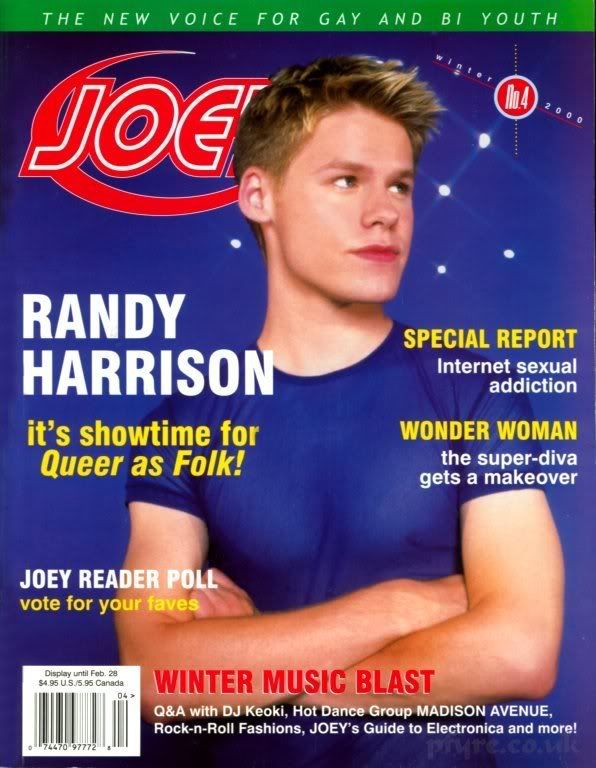
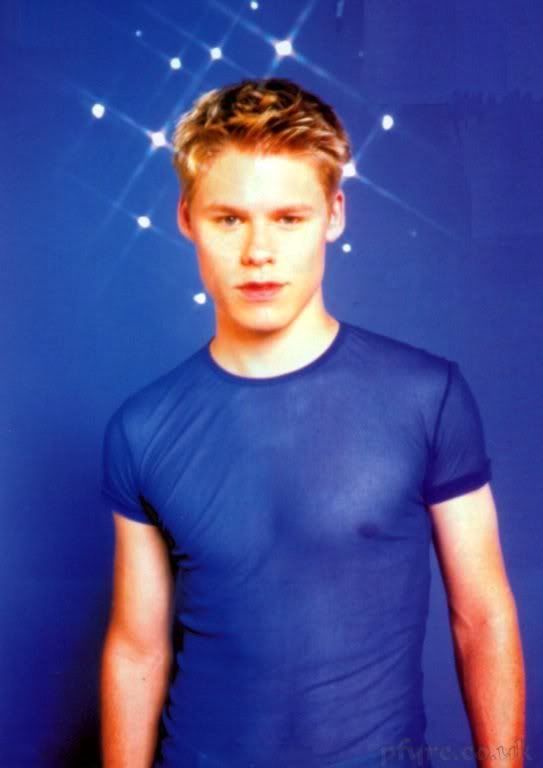
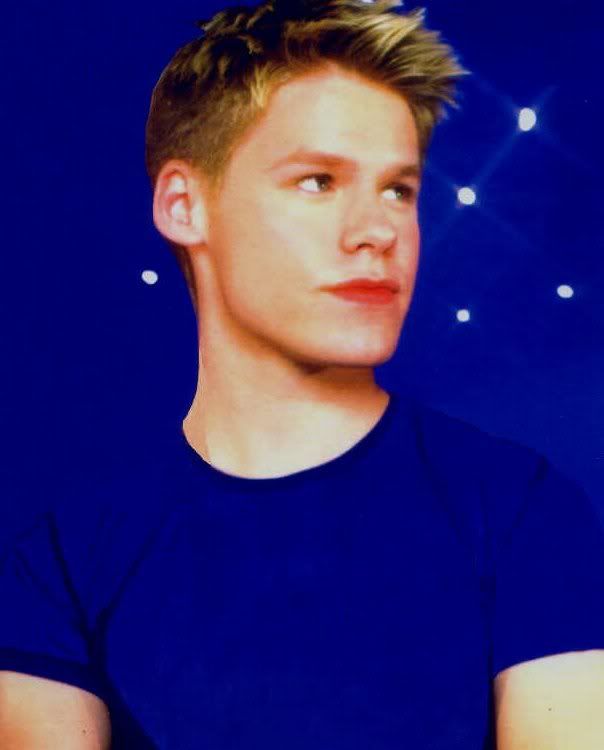
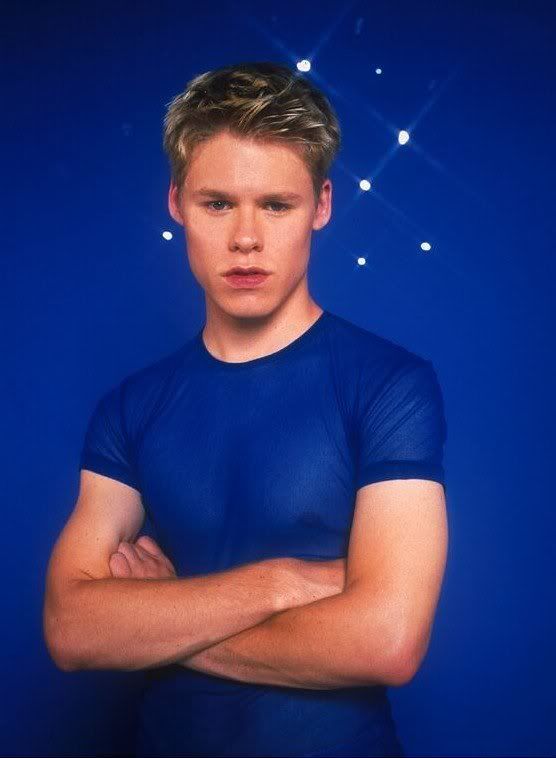
Joey
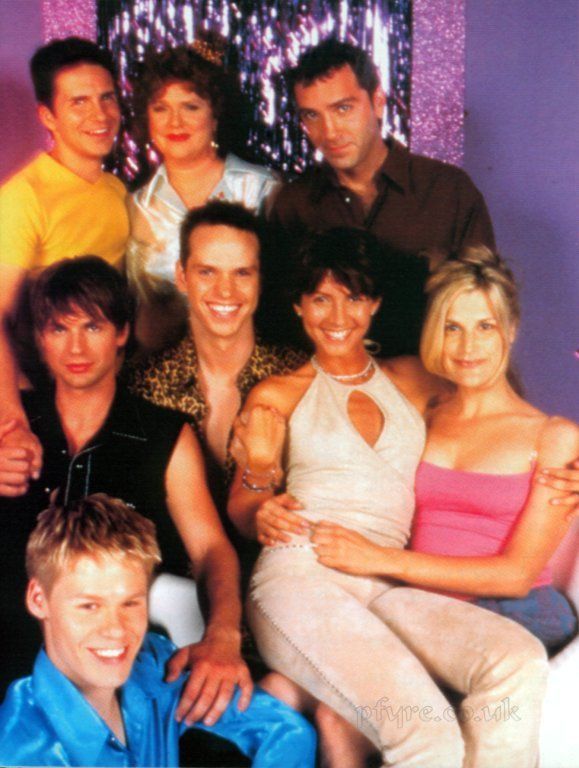
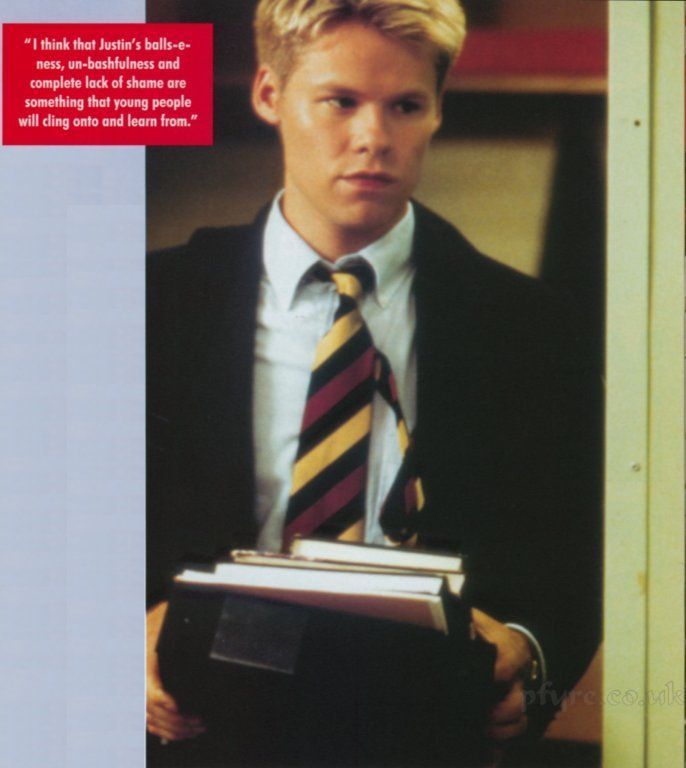
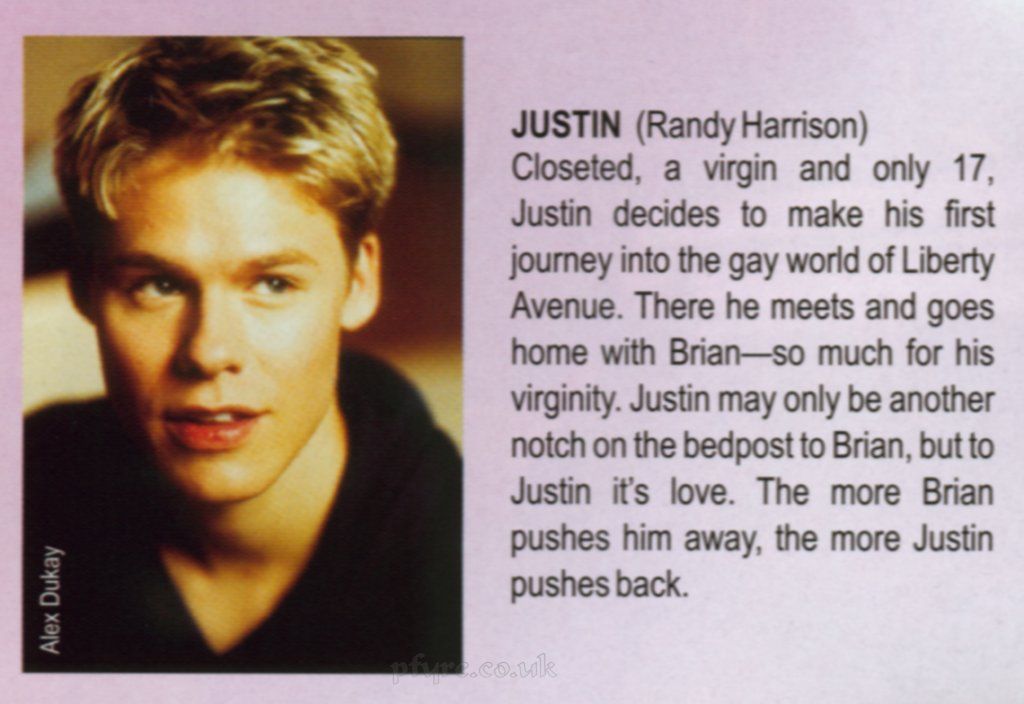
Joey - 2000
Randy Harrison Bares All
" You’re always reading about everyone saying that the American version is not going to be as extreme. That’s bullshit, absolute bullshit. It’s going to be just as [extreme], if not more," says Randy Harrison when asked about the amount of sexual content in Showtime’s provocative new series, Queer as Folk. This December, you can see exactly what Randy is talking about as he plays the role of 17-year-old Justin in the edgy series that is filled with boys, sex, parties, clubs, hard bodies, loud music and late nights. Based on the widely popular British series, the story line centers on the everyday lives of seven gay men and women, and is a mature, truthful and often explicit exploration of the gay experience. Randy’s character is often the target of controversy because of his age, and because of the explicit acts that happen in the course of his character discovering his own sexuality.
Most likely this is the first time you’ve heard of Randy Harrison, but the blonde cutie has been acting since seven. "Acting is the first thing I remember doing, and I just never stopped," recalls Randy. Born in New Hampshire, Randy and his family moved to Atlanta, Georgia when he was ten. It was there, at 16, that he made the tough decision to tell his parents and close friends that he was gay. "It went pretty well, and it was pretty ideal, but difficult as well, just like it is for everyone else I imagine." After high school, Randy left for the University of Cincinnati’s Conservatory of Music College, where he studied theater and performing arts.
After graduation, he moved to New York to work in theater, where he had already landed an acting job at The St. Louis Municipal Theater and performed in many plays, including 1776, Grease and Anything Goes. "I just started pursuing theater, I assumed that’s what I would do, since that was where I had all my experience," he says.
But life as Randy knew it was about to change, and quickly. After being in New York for only a month, his agent sent him to the Queer as Folk audition in L.A. About two weeks later, and in the middle of his theater work, Randy got the call that he had been picked to play Justin. "I was so excited," says Randy. "It took a while to sink in." He realizes that it all happened pretty quickly for him and how fortunate he is. "I really didn’t have the typical ‘New York-starving-actor’ experience."
In the series there are three main characters, which are nothing alike, all different ages, and all at various points in their gay life. Gale Harrold, plays Brian, an arrogant 29-year-old advertising executive who is self-absorbed and filled with attitude. Hal Sparks, who is one of the most recognizable names in the cast, plays Michael, an assistant supermarket manager in his late 20s, who is also Brian’s best friend. And then enters Justin, the naive 17-year-old who's just coming out and loses his virginity to Brian, only to fall in love with him, but doesn’t find the same feelings coming from Brian. Through the twenty-two episode series, we follow the twists and turns of the trio's lives as they spend their nights in the blue collar Pittsburgh gay scene and their days trying to figure out what being gay is all about. "Of course, the characters are in no way role models," says Randy, "but I think that Justin’s balls-e-ness, un-bashfullness, and complete lack of shame are something that young people will cling onto and learn from."
As lucky as Randy is, he’s not quite sure of the impact that this role will have on his acting career or life. "Before this, I really had no acting career, and it’s exciting to be part of something different. It’s a great job, I just graduated, and this is the hand I was dealt. I’ll have to deal with the repercussions of it afterwards." The down-to-earth actor seems to have control of everything so far though, and is only really looking to pursue a successful career without having his sexuality become a major part of it. "I’m totally willing to talk about it, but I’m not marketing my sexuality," asserts Randy. "I just want to play really good parts and work with people I can learn from."
Randy isn’t much like the character he plays, though. "Even though my character is gay and I’m gay, he’s still really different from me. I’m not a club boy and really never have been. I’m a homebody," admits Randy. "I like to sit around and read (his favorite author is William Faulkner), go to movies (his favorite being Fight Club) and go out to eat (whatever there is). But I like to have fun too. I throw good parties. People dance. I just feel more comfortable where I know most of the people, and we can just get down." For all you Top 40-music-haters out there, you and Randy may have something else in common as well. He admits that he listens to a little bit of everything and that he will occasionally indulge in some Britney Spears, ‘N SYNC and those other types, but that he "doesn’t own any of those CDs" and he always "hates [himself] for doing it afterwards!"
When Randy completes the filming of Queer as Folk in Toronto, he will return home to New York, where he and his boyfriend live. Randy met his boyfriend, who is also an actor, when he was 19. "We’ve been together now for three and a half years. It’s been really good. Sometimes it’s frustrating to be apart, but he comes up and visits all the time" admits Randy.
When asked if people recognize him yet or not, and if he is ready to handle the fame that is associated with a successful acting career, Randy said, "Once in a while, I get noticed here because a lot of the extras are locals. They just stare at you and follow you around, and you get paranoid. But fame is not a goal of mine, I just want to act in good parts, and if fame is associated with that, so be it."
After this job, Randy hopes to take some time off and travel to Europe and Switzerland. Most importantly, Randy and the rest of the cast are hoping that the gay community will embrace and appreciate their work this December. "I just think this is the thing that the gay community has been waiting to see for a long time. And for once, this will give everyone what they want."
Empire - Fall 2001
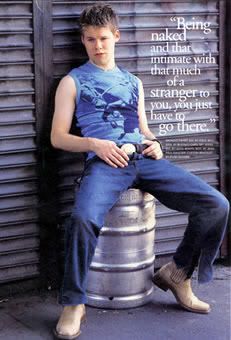
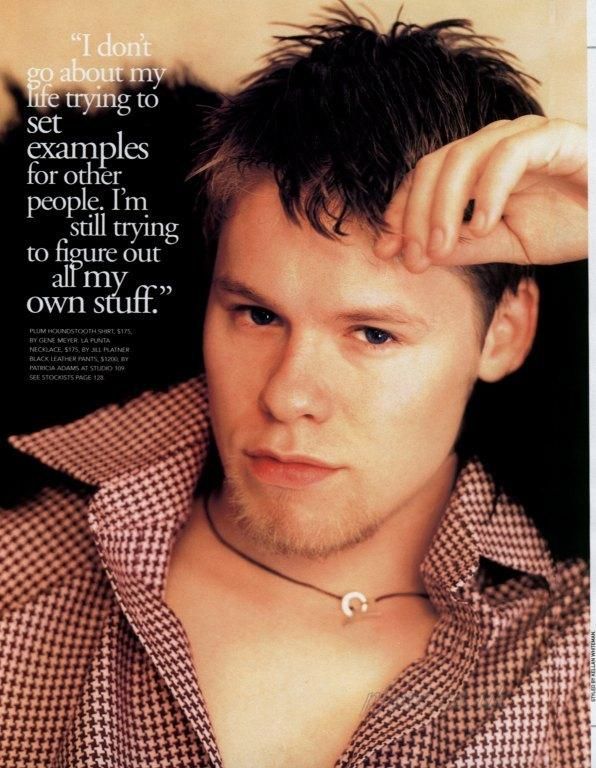
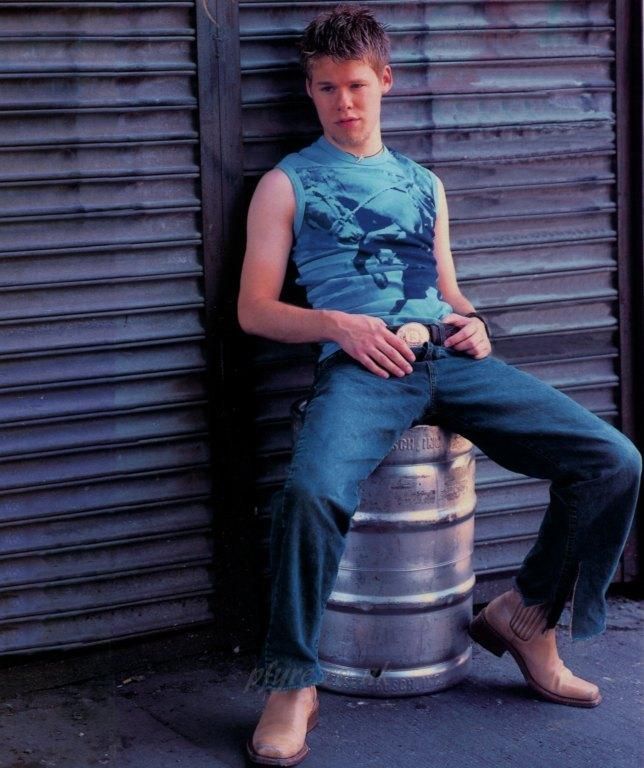
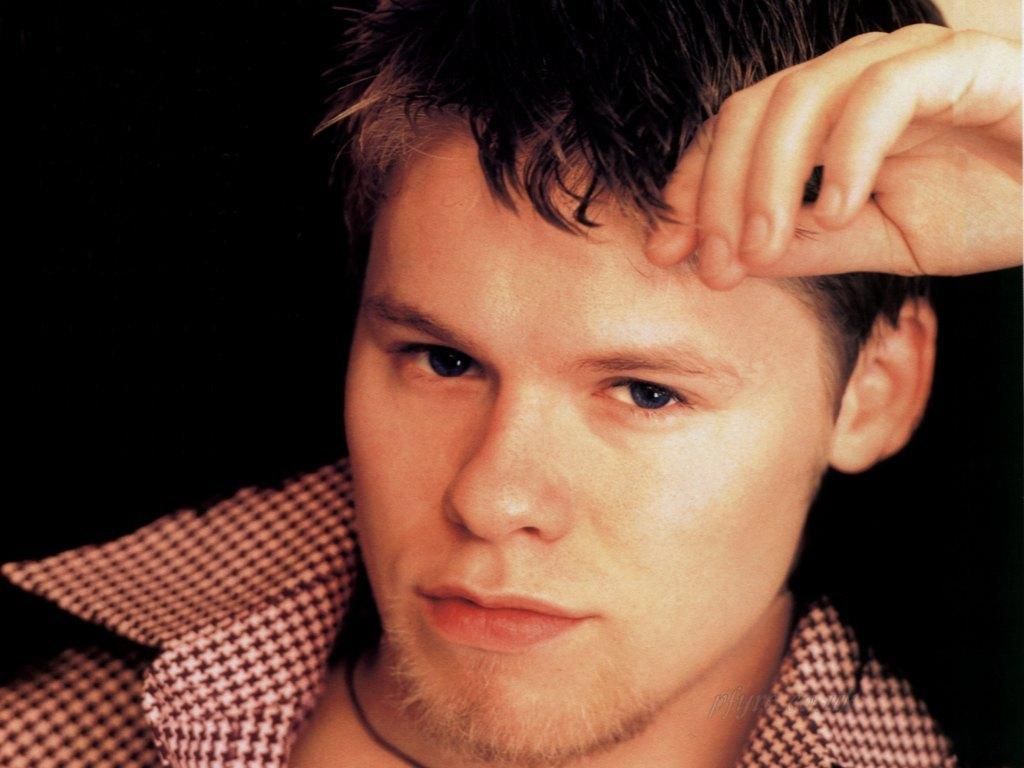
interview with the Empire
A Little Randy
QUEER AS FOLK'S RANDY HARRISON SPEAKS OUT ON THE WHOLE STAR THING, HIS BOYFRIEND, HOLLYWOOD PARTIES AND LOSING YOUR VIRGINITY WITH THE WHOLE WORLD WATCHING
EMPIRE : Randy, does the fact that you're moving back to Canada mean that Justin lives?
RANDY HARRISON :[Smiles] I can't tell you...
E: I know, I know. So let's talk about...real life. With the last year of QAF mania behind you, can you go out without being recognized?
RH: Sometimes. But usually when I go out I get recognized, so I won't go to gay clubs anymore.
E :You get mobbed?
RH :Yeah. It's like a joke.
E :Are you contractually bound to stay looking a certain way? The goatee is a big change.
RH: I'm sure I'll have to shave this off. It's kinda like I'll do whatever Justin'll look like. I'm sure he wouldn't grow a goatee. [Pauses] He could though - who knows?
E: I know you're in a relationship now; how has fame affected it? How does your boyfriend feel when you're off partying with movie stars?
RH: It has affected us very slightly. And I have to ease into all that, because I don't feel comfortable partying with people I don't know. I still hang out with the friends that I hung with before.
E: With your boyfriend, too?
RH: Just me alone or together. It doesn't matter. I mean, distance is the thing that's affected my relationships more significantly than the star thing - living in Toronto while my friends are here in New York. Actually, my friends are spread out all over now. Everybody, as they grow up, is going different ways.
E: One way you branched out is by taking on such an unconventional role in Queer as Folk, where your very first episode called on you to do a nude, anal-sex love scene. How did you prepare for a scene like that, one that was going to be part of an episode that was so hyped?
RH: I didn't have to prepare that much, because Justin was so inexperienced at that moment. It was actually not as difficult as it probably seems. You have one choice: either to go completely with it and do it all the way, or else you just don't even come close. Being naked and intimate with that much of a stranger to you, you just have to go there.
E: Had you and Gale rehearsed much?
RH: No. It was the third day of shooting. I didn't know Gale well at all. But shooting it had a lighter feel than the finished scene, because the director is yelling out direction as we're doing sex. There was a lot of cutting and laughing...
E: How did you get the part?
RH: I did a video. I had just graduated from school, did a showcase, and a few agents were watching. When I read the script I was like, 'I have to play this part' I knew I could handle it.
E: Were you concerned about the kind of publicity everyone was expecting for the series? Sharon Gless [who plays the show's PFLAG-perfect mom Debbie] has said that she expected a lot of controversy and wanted to be part of it.
RH: Actually, that was exciting to me. In the first scene where Gale and I had to make out, I started laughing. He said, 'What?' I was like, 'This is gonna look so bad. I look so young! Doing it with an adult man, it's going to be shocking.'
E: Did you ever second-guess taking the role ofJustin?
RH: No. I was at a place in my career where I was just beginning. I didn't have anything to lose by taking the role and I had everything to gain.
E: There are probably so many young gay men and lesbians out there drawing strength from Justin's story. Do you feel like a role model?
RH: Personally, I feel maybe I'm a role model, in that I am an openly gay, successful actor at my age. But I don't feel the show gives me a responsibility to behave in a certain way. I don't go about my life trying to set examples for other people. I'm still trying to figure out all my own stufE
E: How do you feel about Justin? In many ways he's the emotional center of the show. He exemplifies the themes of innocence vs.experience and the question of whether love is possible in the modern gay world.
RH: I just love him. He's so aware. A lot of times, when I would first read the scripts, especially after Justin started growing into his own, I would want to know why this guy is still with Brian. From the outset it's an abusive relationship. I needed to invest in their relationship not as a sexual thing, but as Justin's genuine love for this man. And out of that, I think, came Justin's wisdom.
E: That's the question I think a lot of people have about Justin: Why the hell is he so fixated on that asshole Brian?
RH: Really? For me, it's that there are definitely parts of Brian that nobody has seen, except for Justin. I think Justin knows that and is aware that those parts need to be nurtured. If Justin were to leave, potentially those parts of Brian might never come out again.
E: Do you draw a lot on your personal history for this character?
RH: As much as I can. I think his wisdom and intelligence were less given by the script initially, and I sort of put them onto him. Then the writers caught on and started including that in the text.
E: What about your own first love? Was it anything like Justin and Brian?
RH: Oh, no. [Laughs] Not at all.
E: Your first time was blissful and idyllic?
RH: No, no, no! Is it ever? I mean, no, it was terrible. I never fell in love.
E: Tell me about your character in Bang, Bang You're Dead.
RH: He's kinda like the head of the trenchcoat mafia.
E: So after the angelic Justin you get a chance to play someone evil.
RH: He's not evil. I can't play any character that's.. .But he's definitely very hurt.
E: What were you going to say? You can't play a character that's what?
RH: You can't go in being.. .1 mean, 'this guy's evil.' But you have to go in, or at least I go in, loving the character and wanting to figure him out. Working on the part was so upsetting, because the whole time I was reading all this [Columbine High School killers] Eric Harris and Dylan Kliebold stuff. They have journals that are still online, and they have worship sites where teenagers go. But then you look at them from the inside out, and they're beaten down kids who were the geeky nerds. They were, like, 'You know what? Fuck you! You can't beat me up any more and I'll make you sorry I definitely empathize with that, as an underdog. I mean, granted I would never go to that extreme. But it's really not hard to understand - especially when they were raised in a culture of violence and took antidepressants on and ofF, which totally flicked them up chemically. And then with the kind of abuse they suffered at school...
E: Starting with the character's hurt is a very humane approach to such a role.
RH: I think it's the only way to give the character justice. People's hate makes sense to them, unconsciously, so you need to figure that out so it can make sense to you, too!
New York - 29 April 2002
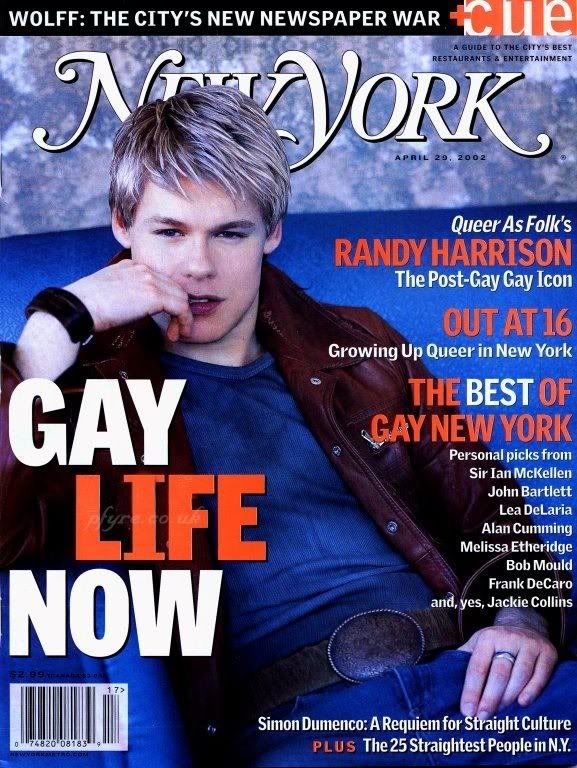
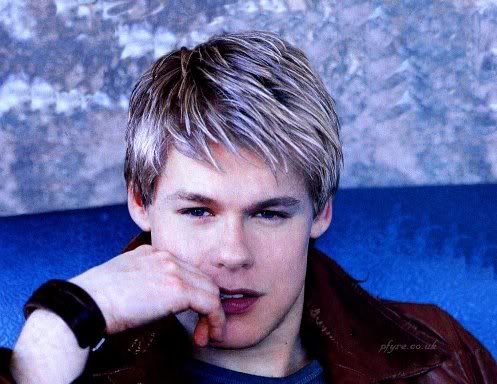
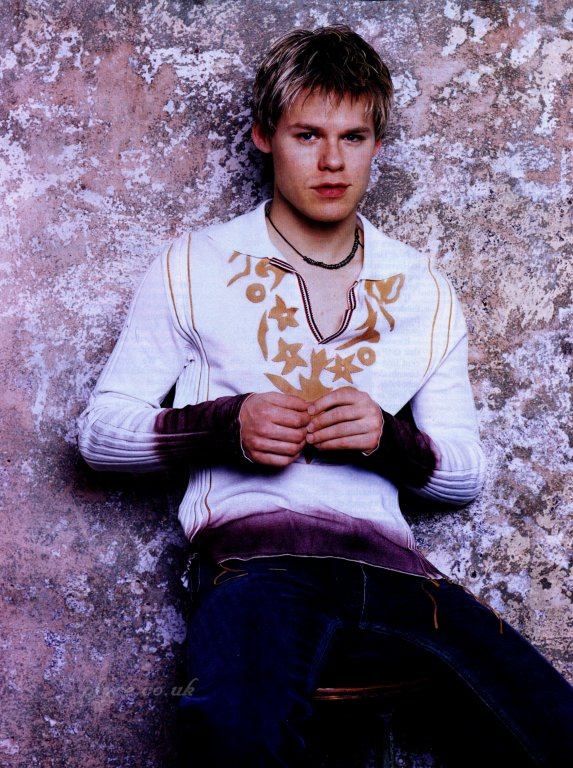
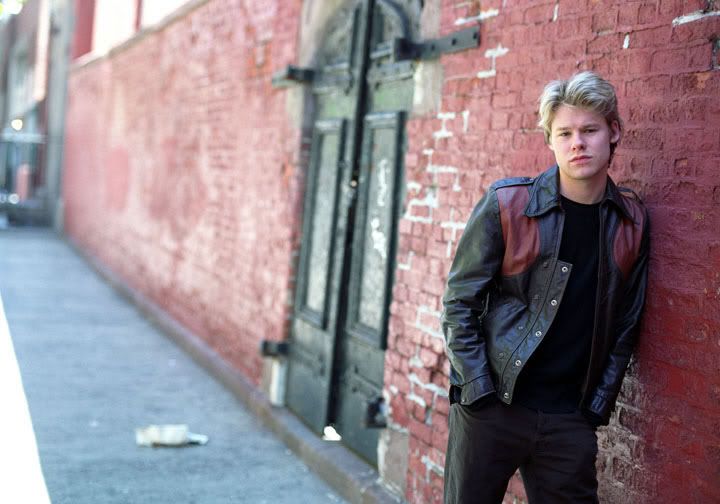
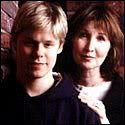
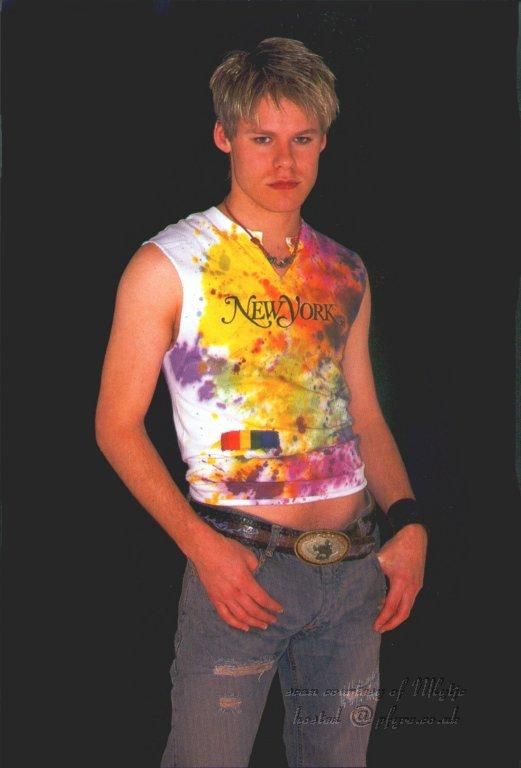
http://newyorkmetro.com/nymetro/urban/gay/features/5945/
The Post-Gay Gay Icon
He's hot, he's talented, and he's out. No surprise that Queer As Folk star Randy Harrison has legions of fans. But who'd have guessed how many of them would be women?
Since this is the gay issue, and Randy Harrison is one of the stars of the gayest show on TV, Showtime's Queer As Folk, we might as well get the gay question out of the way.Which, actually, is exactly what Randy Harrison has done. "I told my close friends and my parents when I was 16," he says. And then he did something else: Unlike most gay actors, he never bothered to go back into the closet.
"I had a conversation recently with these gay movie producers about how in Hollywood pretty much everybody behind the scenes is out. But the actors still aren't. In a way, it just seems like it's too late for established actors to come out, because they've been part of the illusion, this mass manipulation, for too long." The machinery is still grinding away, says Harrison. "In L.A., people's publicists package them with other people to create the appearance of a relationship -- they call the press and say, 'Be outside this restaurant at this time and you'll see this actor and that actress, and they're together.' Once you're caught up in that, you're fucked."
"How many people have done what Randy's done?" asks Ron Cowen, the co–executive producer, with Daniel Lipman, of QAF. "In terms of gay history, how many actors at 24 years old are out and are as successful and in as visible a position as Randy is? I can't think of any. In a way, he's a first."
Now let's get the "is he acting or just playing himself?" question out of the way. Short answer: He's acting.
Queer As Folk, for the uninitiated, shows a particular slice of gay culture: the sex-crazed, club-hopping milieu. For this reason, it's both loved (for its frankness) and hated (by those who think it reflects badly on the gay community). But when Harrison -- who lives in the East Village when he's not shooting in Toronto -- first got the part, he actually had to do research on gay nightlife: He went to Splash in Chelsea, "because I really hadn't been to a lot of gay clubs. I've always felt like a dork in gay clubs. Like I don't have the body thing, and I'm not into the body thing. And the first gay bar I ever went to when I was living in Atlanta, I felt more isolated than I ever have in my life. I thought, My God, is this internalized homophobia? Is this self-hatred? Eventually, I realized I'm just a gay man who hates dance music." (Harrison's partial to the White Stripes, Clinic, early Bowie, Lou Reed.)
In person, Harrison is quietly intense, and his look -- wire-frame glasses, an exceedingly bland tan sweater, unremarkable jeans -- is so understated that it doesn't even qualify as geek chic. On QAF, Justin's nickname is Sunshine because of his generally cheery disposition -- though that's been changing a bit lately. In this, Queer As Folk's second season, Justin has gotten more nuanced: He's been recovering from a brutal gay-bashing in last year's finale.
"His character is taking some turns now," says Sharon Gless, the Emmy Award–winning actress (Cagney & Lacey) who plays the proud-mom-of-a-gay-son on QAF. "And sometimes I like just standing back and watching him work. Randy is a phenomenon." Gless says Harrison recently filmed a scene in which his character displays a dark edge. "The transformation he did from being this sweet child to being cold -- cold! -- was astounding. And I thought, Oh, my God, this kid is good."
Now let's get the personal- and professional-history stuff out of the way. Randy Harrison was born in New Hampshire, but his family moved to Atlanta when he was 11. (His dad is the CEO of a paper company; his mom's "a thwarted artist and a genius"; his older brother is a bank manager.) The acting thing happened in preschool: "My parents couldn't find a baby-sitter, so they brought me to a production of Peter Pan when I was 5. I was transfixed. I knew I wanted to be onstage after that."
His gay-style résumé has always been paltry. "I was so grunge in high school. I wore huge flannels and Doc Martens and cords." Post–high school, he survived the brutal (and renowned) theater program at CCM, the University of Cincinnati College Conservatory of Music, even though he wasn't exactly popular with the faculty. (The program director boycotted his rebel production, with a group of fellow students, of Shopping and Fucking.)
He moved to New York, and then, having never before appeared on-camera, got cast in Queer As Folk after one audition and two call-backs.
"Thank God they were desperate," he says of the QAF producers.
Now let's get the instant-fame thing out of the way. Here is the typical fan reaction -- not just to Harrison but to the entire QAF cast -- according to Harrison's co-star Peter Paige: "Obsessed! Screaming, crying, 'Ohmigod, ohmigod!' "
If you're picturing hysterical homosexuals, think again, because that reaction actually comes from teenage girls, says Paige. And lots of older women, too (though they're not nearly as rabid).
It's a weird quirk of mainstreamed gay culture that QAF is a hit with straight women. At a recent first-season-DVD-signing session at the Lincoln Center Tower Records featuring Harrison, Paige, and co-star Gale Harold, "it was like 'N Sync or something," says Harrison. "I think we signed 700 or 800 boxed sets." At $90 a pop.
Okay, the graphic-sex thing. It's time to get that out of the way -- because QAF really can be steamy, at least as steamy as, say, Sex and the City.
Harold, the straight actor who plays Justin's boyfriend, Brian, says, "A lot of it happens in editing, although Randy and I are certainly making out and simulating sex. We're comfortable enough with each other to be able to give them enough raw material, you know what I mean?"For his part, Harrison says, "The sexuality required for the role never scared me at all."
And then, finally, to bring things full circle, let's get the future out of the way. As in, does an out-at-24 actor have one?
Apparently, yes. Next week, previews begin for the MCC Theater's A Letter From Ethel Kennedy, directed by Tony winner Joanna Gleason. It's Harrison's New York stage debut. And later this year, he plays the "head of a group of total outcasts" in Bang Bang You're Dead, a scathing Showtime movie about high-school violence.
It's a breakthrough role for the breakthrough actor because Harrison's character is straight.
"I'm still associated with the gayest show on TV," he says, "but the fact that I got the coming-out over with means the gay-actor thing will be on the back burner. At some point it'll be, 'He came out so long ago nobody even cares anymore.' "
http://www.qaf1.org/read.php?t ... ;toread=&page=1
New York
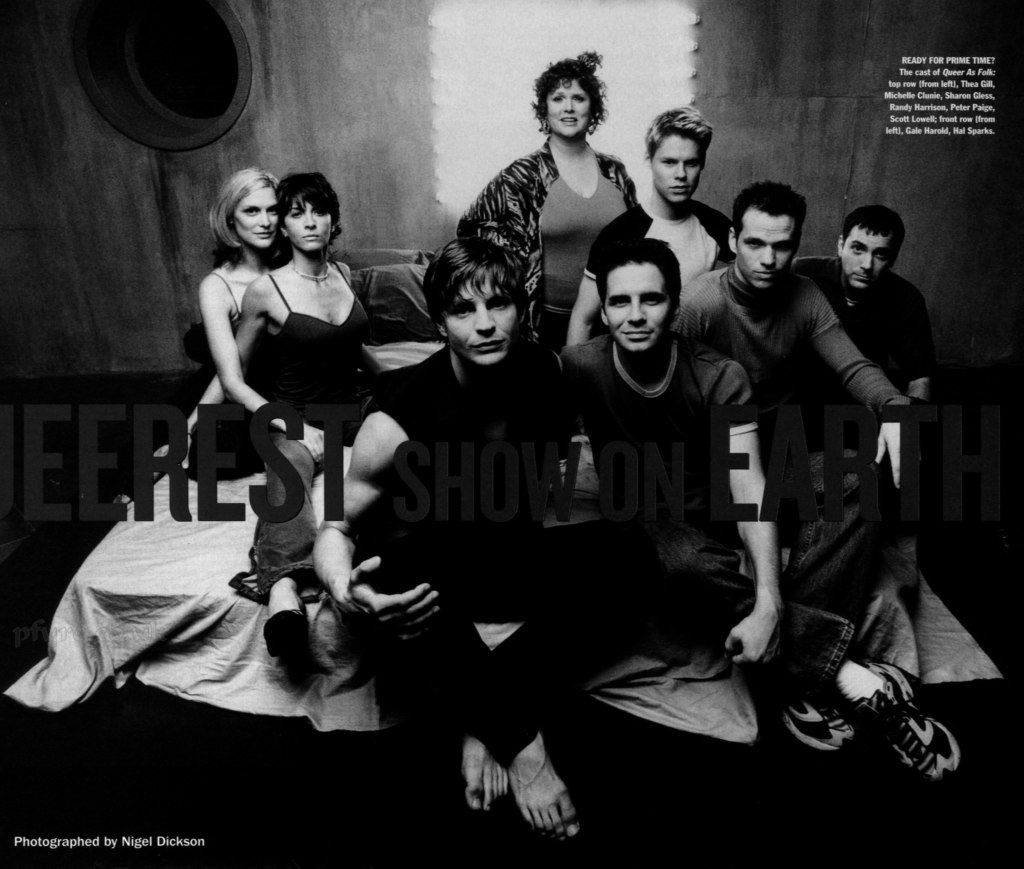
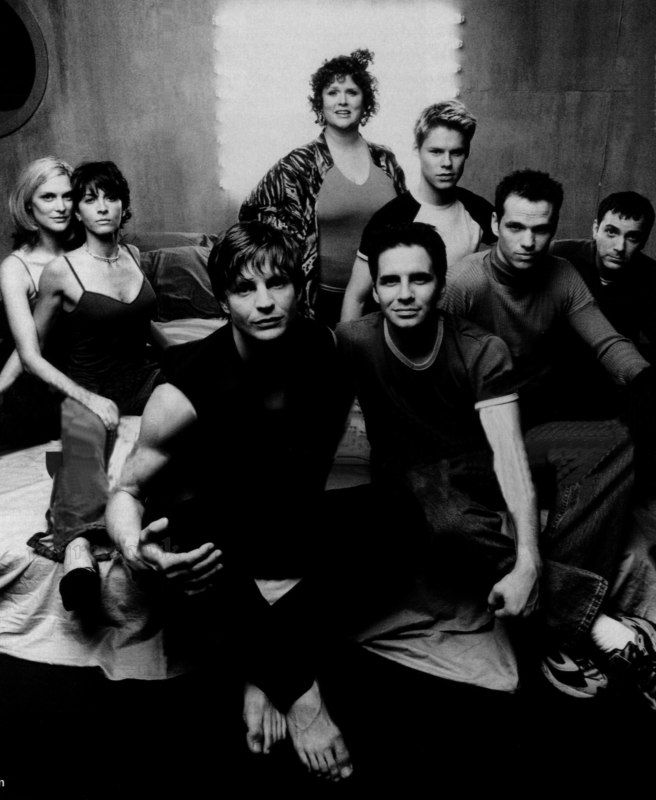
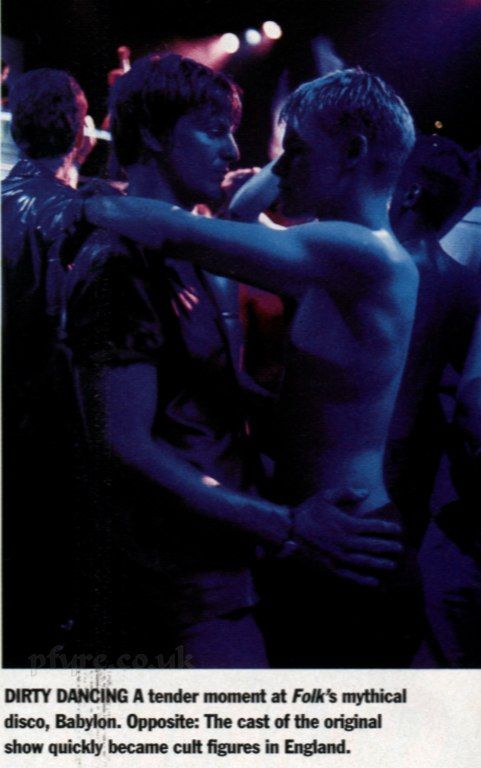
The Advocate - 17 September 2002
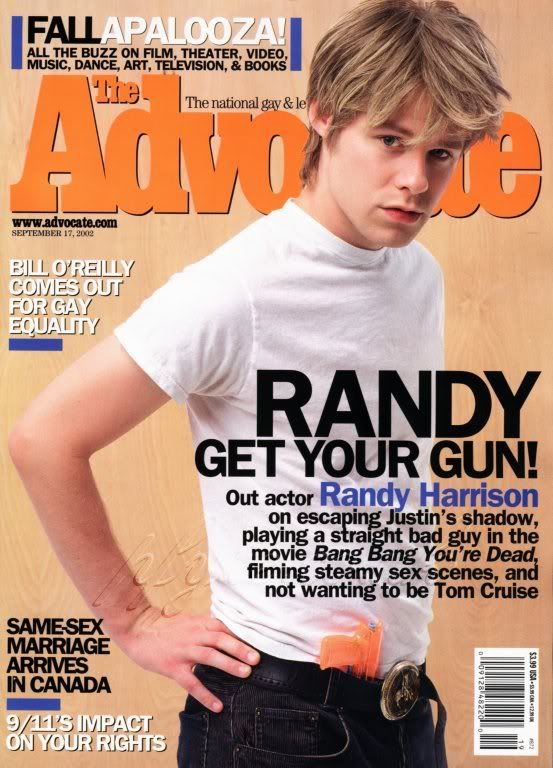
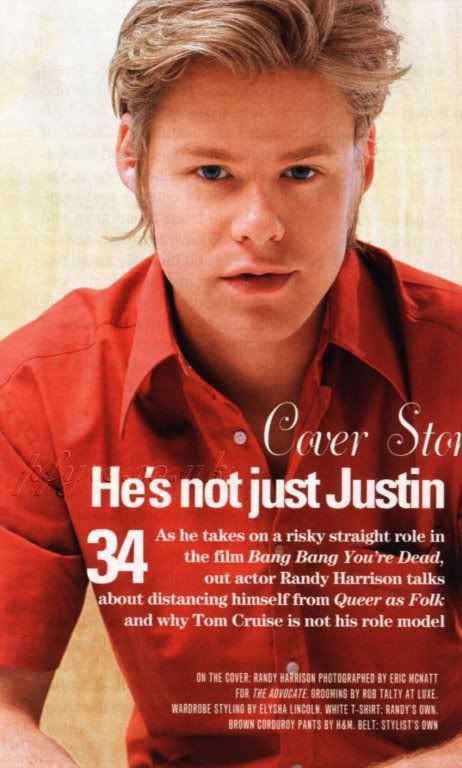
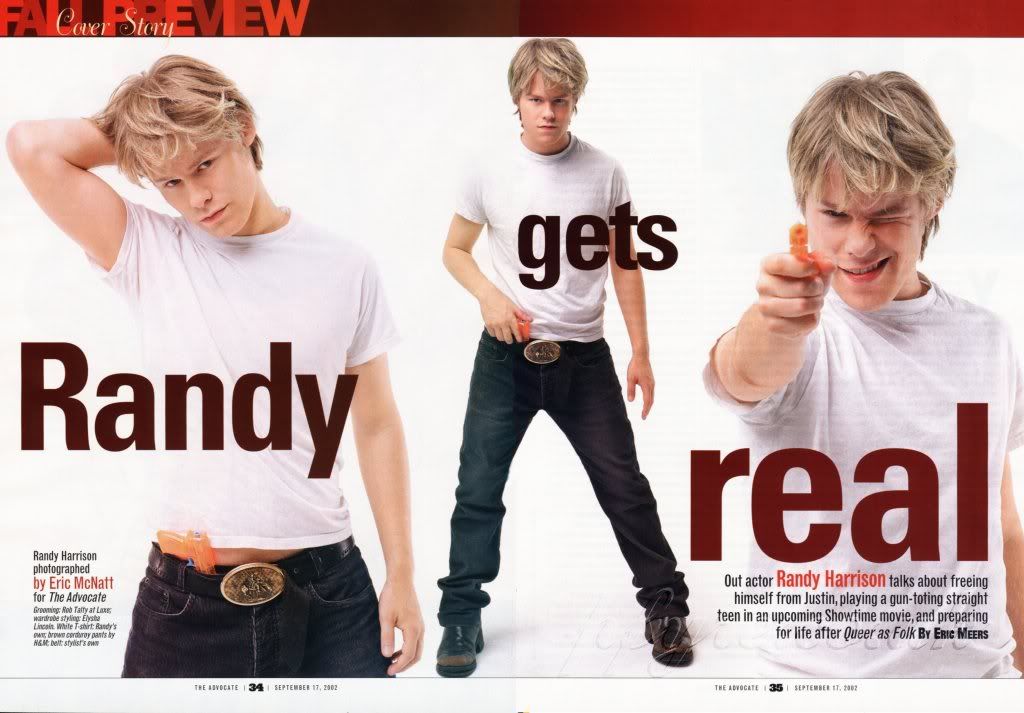
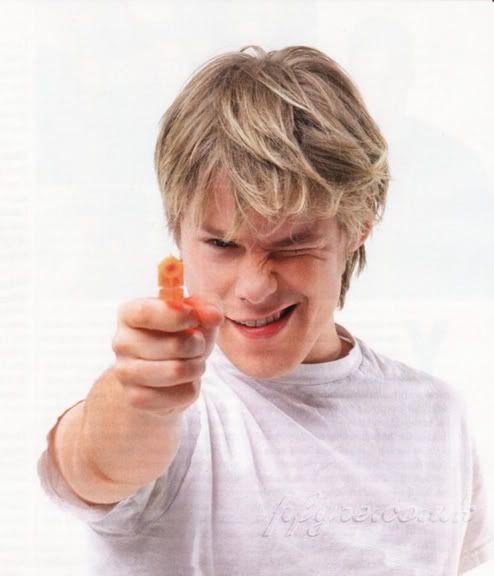
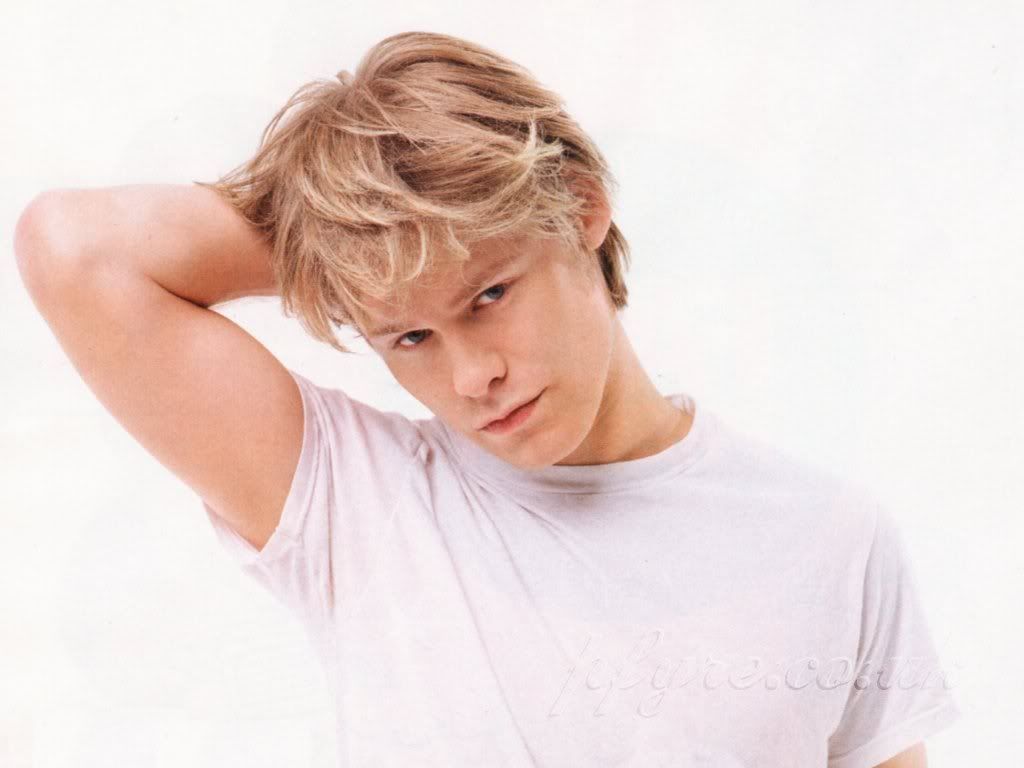
Randy gets real
out actor Randy Harrison talks about freeing himself from Justin, playing a gun-toting straight teen in an upcoming Showtime movie, and preparing for life after Queer as Folk
17 September 2002
by Eric Meers
You might never notice him on the street, and Randy Harrison likes it that way. Walking into a restaurant for an interview, Harrison is camouflaged with glasses and a baseball cap. Once seated safely at a discreet table, the specs and hat come off, and there it is: his signature mop of fair hair. It seems the 24-year-old actor is having a bit of an identity crisis these days and wants to talk about it.
The crux of his concern is Justin Taylor, his Queer as Folk alter ego. While he remains devoted to his costars and to the show, Harrison is also striving to build a professional profile separate from the series. At heart a stage actor, he spent May in an off-Broadway production of A Letter to Ethel Kennedy (as a straight waiter) and appeared onstage this summer in New York's Fringe Festival. This fall he'll make another important step away from QAF with a Showtime movie about high-school bullying and Columbine-like violence. In Bang Bang You're Dead, Harrison plays Sean, the outcast students' ringleader, whose response to harassment couldn't be more different from Justin's.
Not that Harrison fails to acknowledge what a boon Justin has been to his career. Just after earning his theater degree at the University of Cincinnati-College Conservatory of Music, the young actor catapulted to fame in late 2000 with Queer as Folk's much-heralded debut on Showtime. Playing the nubile Justin, the 17-year-old trick who wouldn't leave 29-year-old Brian Kinney (Gale Harold) alone, Harrison seemed to represent the idealistic youth in search of true love that so many gays, lesbians, and, yes, straights could identify with. But such innocence was bound to be spoiled by the bed-hopping, drug-snorting boys who surround QAF's core group of gay pals, and in the space of two seasons Justin has dabbled in casual sex, substance abuse, go-go dancing, and even sex for pay.
Like Justin, Randy has grown up considerably after spending two years as the youngest out actor on TV. While his cherubic face is as boyish as ever, it is an older and warier Harrison who spoke with The Advocate about life before and after Queer as Folk.
Q:It seems the role in Bang Bang You're Dead is a departure for you because you're playing a straight character.
R:I think it's great, [but] it's upsetting that it is such a big deal. I wish it weren't an issue all the time. It's funny that people say it's a departure, because I've been acting since I was a child. I've played three gay roles out of hundreds.
Q:Did you have any trepidation about playing such a heavy?
R:No, it's the type of thing I'm drawn to. I didn't even audition. The director [Guy Ferland] wanted me for the part, and I read the script and called them back [and said yes]. I was happy that they offered it to me. I thought it was different.
Q:Do you worry that since people identify you so much with Justin, it will be difficult to get other work?
R:I know that I'm capable as an actor. I'm tired of being solely being "Queer as Folk's Randy Harrison." Unfortunately, you can't be anything else until you get other work out there. [But] it has also opened up so many opportunities for me that, I can't really complain too much.
Q:What was your reaction when you first picked up the QAF script?
R:I had actually read about the British show and the character of [Nathan]. And I said, "They should do an American version. I'd be perfect for that." This was one of the scripts that I felt, I should do this part. It's so obvious.
Q:Did you ever hesitate to take the part and be openly gay as well? Did you ever think to yourself, Most actors are in the closet?
R:No, I never hesitated once. I still aspire to a theater career. The amount of celebrity that I have now seems like a fluke to me. So I never felt a need to manipulate my career from the outside--try to be someone I wasn't to get ahead.
Q:There's a big difference between stage actors and Hollywood actors. There are many famous out Broadway people, whereas most Hollywood actors feel the need to be closeted.
R:Absolutely. I don't know what it is. I just don't think that I could be the kind of actor I want to be and not be honest with myself. Honesty is very important to me as an actor and as a person. I didn't even think about it. I don't want to be Tom Cruise. I'm not after some movie blockbuster career. That's not the kind of work I'm interested in. And frankly, it's not the kind of work I'm ever going to get.
Q:Band Bang You're Dead was an interesting choice for you in part because bullying is such a huge issue for gay youth. Did you experience that when you were in high school?
R:Absolutely, yeah. Mostly when I was younger. The typical kind of thing.
Q:Anything specific you remember?
R:I can, but I don't like talking about it. By the time I came out, that kind of stopped it. The bullying stopped when I claimed myself and proved that I wasn't afraid. A lot of it was when I was hiding when I was younger.
Q:Did you witness any school violence?
R:A kid brought in a BB gun and shot another kid. He was expelled. And someone got expelled for blowing up mailboxes.
Q:So this story rang true to you?
R:It did. I could definitely empathize with the character, with the feelings of helplessness--if only the desperation and the feeling of isolation.
Q:You grew up in Georgia, right?
R:I was born in New Hampshire, and I moved to Georgia when I was 11.
Q:Was that a huge cultural shift?
R:Oh, yeah. I'm definitely a Yankee, a New Englander at heart. Both my parents are Southerners, so they always wanted to go back to the South. I was always the shame of the family--the one Yankee who was actually born in the North.
Q:Where did you live in Georgia?
R:Alpharetta. It's a northern suburb of Atlanta, a 45-minute trip outside the city. Very conservative.
Q:When did you start understanding that you might be gay?
R:I guess I had a suspicion of it my entire life without knowing exactly what it was--knowing that there was something different about me, which I attributed to being an artist. At 11 or 12 I started sort of clarifying for myself. It took a while.
Q:When did you tell your parents?
R:When I had to. I mean, I love my parents. Coming out to them was sort of coming out to myself. I educated them, and I wanted our relationship to keep growing. I wanted them to be a part of my life still. I wanted to be able to share with them what I was going through.
Q:Was this because of being bullied?
R:No, I wasn't being bullied at school at this point. I had a group of friends, and I was isolated because I wasn't communicating with my parents. I wasn't telling them what I was going through.
Q:What was your parents' reaction?
R:Positive. Dad said that he was prouder of me than he'd ever been when I came out.
Q:What was the reaction at school?
R:I just told my friends. At that point I was pretty much out anyway. It was not a big deal.
Q:Were you able to date?
R:No, I wasn't dating anyone. I was hyper-focused on acting. So I didn't bring a guy to the prom. I was the lone gay person as far as I knew.
Q:Did you date in college in Cincinnati?
R:Yeah, yeah. It was fine. It wasn't a big deal. I didn't freak out about it. I was beyond the novelty of homosexuality. I just dated the people I liked. Mostly I was concentrating on acting, fighting to do what I wanted to do careerwise.
Q:Tell me about how you got involved in performing.
R:I started performing when I was a kid. I don't remember myself not being an actor. When I was 4 my parents couldn't get a baby-sitter for me when they were going to see a performance of Peter Pan. I was fascinated by the whole thing. After I saw Peter Pan I started auditioning for community theater. I acted all through my childhood. I went to Stagedoor Manor, this big Broadway kids' camp, when I was 9 and 11. I've done two plays a year since I was 6 until I got [Queer as Folk].
Q:When you moved to New York in 2000, did you have an agent?
R:I had been doing summer stock every summer while I was in college. We did a showcase, like most good conservatories do--monologues and things that agents and casting directors come to see. From that I got an agent.
Q:But you were in New York for a very short time before Queer as Folk.
R:A month and a half. I already had a summer job in a play in St. Louis. Right before I left for St. Louis I got the audition for the show and then a callback. So I was late getting to St. Louis. I had a day of rehearsal, and I got another callback, and they flew me to L.A. After the second call-back and third audition, I knew I had gotten the part. I went back to St. Louis and then back to Atlanta to drop off my stuff before I flew to Toronto to start filming.
Q:Tell me about filming that first scene of the series--the one that everyone always talks about, when Justin is having sex for the first time.
R:I've done sexual stuff before--onstage, which is even more emotionally difficult. With a [TV] crew around, you are stopping and starting; it becomes really technical.
Q:It's not erotic at all.
R:No. When you watch it, you're like, Wow. I look like that. But it doesn't feel like that at all. It was about communicating with Gale [Harold] and getting across what I wanted to say about the character.
Q:Do you ever get a script and say, "That doesn't ring true to my experience?"
R:The whole character of Justin and the club life he lives--I have no experience with it. It's really foreign to me, which is annoying, but that's just how it is.
Q:How do you feel about your fans?
R:It makes me really happy. There are some crazy ones. I think the gay community is split: They either love [the show] or love to hate it. For me it's always the middle-aged women and teenage girls. It's nice to see that people in Middle America are really affected.
Q:I imagine you must get a lot of mail from at-risk gay teens.
R:I do. I usually just write back and say, "Thank you." The stuff I get is not that severe like, "I'm going to kill myself." I do get a sense that seeing Justin can be a great comfort to a lot of people. They feel that they can stand up for what they feel and who they love.
Q:Are there things that you can't do anymore because of your fame?
R:I can't walk down the street with my head up. I'm not a hat wearer, but now I'm a hat wearer. I don't want to be the center of attention. My posture has changed. I walk with my head down and shoulders slumped. Suddenly I carry myself as if I'm ashamed of something.
Q:Any unpleasant fan experiences?
R:Rarely, but it happens. It always weirds me out and makes me unhappy that some people think I'm Justin. I'm not. People can be talking to me and I know they think they are talking to Justin. It's hard to explain. It's a really subtle kind of thing. It makes me feel like Randy Harrison is not a human being to them.
Q:Yet to many people, you're the face of young gay America. And you're certainly one of youngest out actors to appear on The Advocate's cover.
R:It makes me proud, and it makes me scared. More than anything, I want to be an actor and I want to keep working, and I think there's a danger in being perceived as a poster boy for something. While it's great to be an out actor, I never really had any goals of activism. All my goals are as an actor--to do different kinds of work. It's ironic too. Besides the fact that I sleep with men, I have very little sense of being part of the community of homosexual people, for whatever reason. I have a group of six friends, two of whom are gay. I associate the gay community with a subset of the gay community that I'm not a part of.
Q:You mean the subset that's represented on Queer as Folk.
R:Yeah.
Q:And you don't identify with that set.
R:I'm just not one. It's a clique that I've never been a part of. It's not like I identify them in a negative way. A lot of my friends are club people [laughs]. It's not me. It's funny to represent that, because it's not me. I don't fit into a gay club setting. It's just ironic that I represent that somehow.
Q:So what do you feel when you see friends living out some of the issues your character is dealing with in the show--the drug use, casual sex?
R:I hope that they are finding satisfaction. I'm in no way making a judgment. I know it doesn't make me happy. [But] I wonder what kind of lives they will have built for themselves when they turn 45 and can't really have any connection with people because they are so used to fleeting sexual ... I don't know, I don't know.
Q:Do you think that the show is working toward an answer to that question?
R:I can't speak on behalf of the show. I'm not a creator; I'm just a pawn. I think the sense of community that exists with all the characters--that's the answer. The fact that they have found a family in their friends. It does give some depth and meaning to their lives. I don't know for Justin; he's always looking for meaning out of his relationships with people. I don't think he's as trapped into the drug thing as a lot of the others are.
Q:Knowing what you know now, what would you advise your closeted actor friends?
R:I actually have more respect for people who are in the closet. You end up exposing so much of yourself because you have to talk about your sexual life. You shouldn't have to talk about it. I don't like people who lie. But if you don't talk about it, it's like you're too pussy to talk about it, which I didn't want to be. I would say, "Do it quickly and quietly at the beginning of your career."
Q:I've read that you have been dating someone for three years.
R:I was. I'm not anymore. That ended a while ago.
Q:Are you dating someone now?
R:I'm not going to talk about it.
Q:You've got two more years left on your Queer as Folk contract. Would you sign on for more?
R:No. Not because I don't love the show; I want it to end and start building a career outside the show.
Q:What do you see yourself doing after Queer as Folk?
R:I'm confident in my ability to maintain a career. I don't know if it will be doing either independent films or plays in New England. I sort have this p_w_picpath of myself sort of disappearing for a while and reemerging five to 10 years down the road again. We'll see.
The Advocate - 6 July 2004
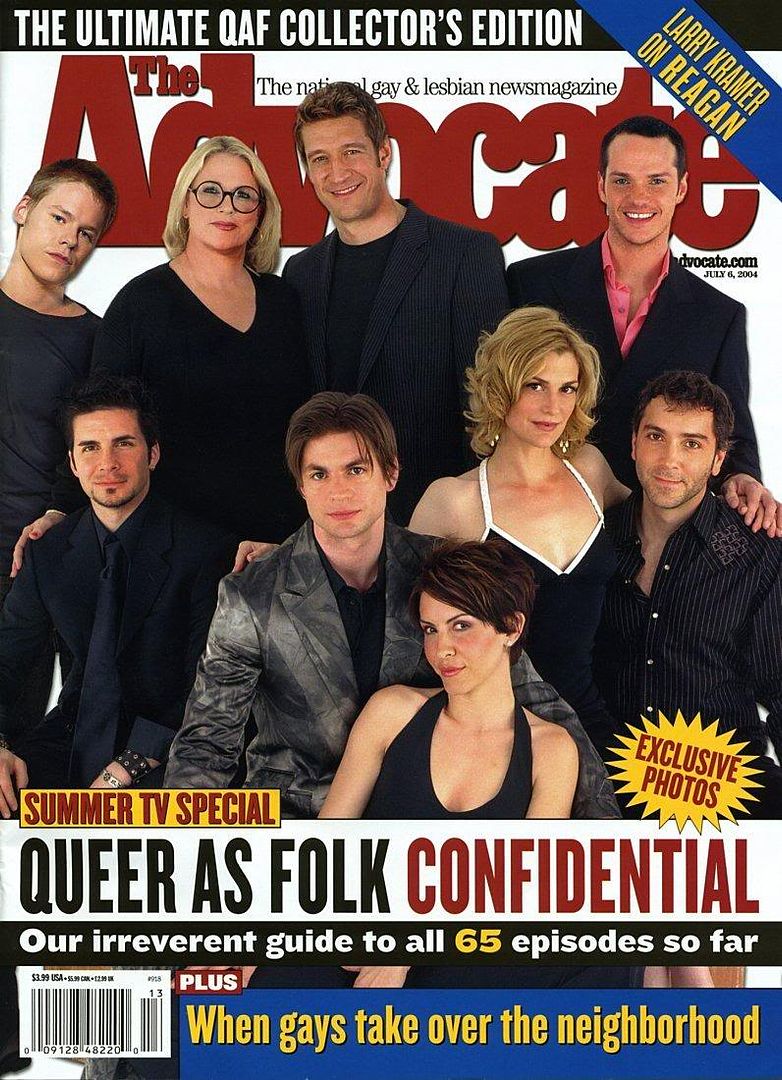
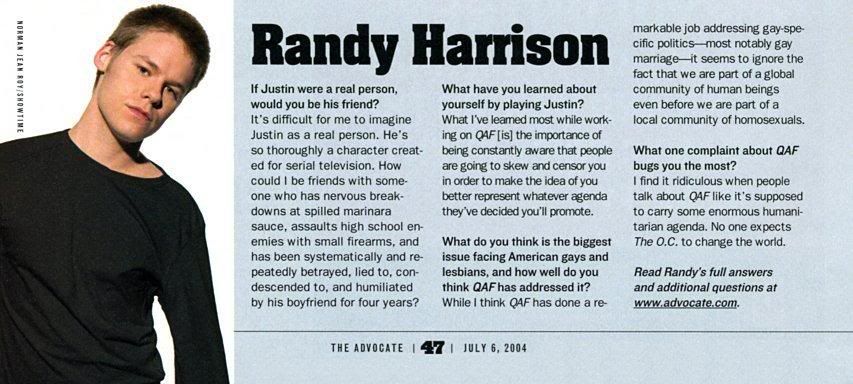
Queer As Folk confidential
Randy
Q: What has been the biggest evolution in your character’s personality or life situation since he first appeared?
Randy:Finishing puberty, losing his virginity, and leaving home.
Q: If your character was a real person, would you be his friend? Why or why not?
Randy:It’s difficult for me to imagine Justin as a real person. He’s so thoroughly a character created for serial television that his behavior, though dramatically justified on Queer as Folk, would register as childish, self-obsessed and absurd if it were displaced into the reality I’m familiar with. How could I be friends with someone who has nervous breakdowns at spilled marinara sauce, assaults high school enemies with small firearms, and has been systematically and repeatedly betrayed, lied to, condescended to, and humiliated by his boyfriend for four years? Were I placed into the TV wonderland of Queer as Folk, on the other hand, Justin and I would f**k once, realize we were twins separated at birth, and try to get our parents back together using elaborately quirky schemes. I’d most like to tell Justin to calm down. Maybe get him into a yoga class.
Q: What’s the one challenge or blessing you hope your character faces in a future episode?
Randy:First off, I think Justin is old enough and financially stable enough at this point to have his own apartment. But, codependent as he is, I’m sure Justin would get a large dog right away, probably a pit bull named Harvey. Those would be two blessings. A challenge Justin might face would be dealing with the ramifications of having his cell phone stolen when he went out at 4 o’clock one morning to innocently walk Harvey and ended up giving a mugger a blow job in a public park lavatory.
Q: What single scene or episode so far has been the most meaningful or memorable for you?
Randy:I’ll always remember having to fake jack-off at gunpoint, because it was so upsetting to me that I didn’t fake cum or even really fake ‘get it up,’ so we had to reshoot it.
Q: What have you learned about yourself by playing Justin?
Randy:What I’ve learned most while working on Queer as Folk has come really indirectly, less from playing Justin Taylor than from dealing with press, corporations, advertisers, the gay community, and fans of the show. I’ve learned the necessity of constantly realigning your perspective and the importance of standing up for yourself and being constantly aware that people are going to skew and censor you in order to make the idea of you better represent whatever agenda they’ve decided you’ll promote. And it’s all done so matter-of-factly, its such the status quo, that it becomes very simple to accept even though it completely corrodes the soul.
Q: What do you think is the biggest issue facing American gays and lesbians right now, and how well do you think Queer as Folk has done in addressing that issue?
Randy:I think the biggest issues facing Americans period, both queer and not, are the environment, the economy, and the war in Iraq. While I think Queer as Folk has done a remarkable job addressing gay-specific politics, most notably gay marriage, it seems to ignore the fact that we are part of a global community of human beings even before we are part of a local community of homosexuals.
Q: Drawing from your contact with gay and lesbian fans and the other gay people in your life, in what ways do you think Queer as Folk has influenced the gay community?
Randy:The most significant feedback I get tends to be from queer teens, often closeted, who feel isolated in various ways and have found that watching Queer as Folk relieves some of that tension and loneliness. I view the gay community as something so large, fluid and diverse that it’s impossible to make a statement like “The show has affected this entire group in this one specific way,” but the letters I read from individuals are things that I know have happened, and they demonstrate to me the difference the show has made in at least a handful of gay lives
Q: In what ways do you think Queer as Folk has influenced the portrayals of gays and lesbians on other TV programs?
Randy:I really couldn’t say. I’m going to imagine not enough.
Q: You’ve heard the complaints about the show from some viewers and critics. What one complaint bugs you the most and why?
Randy:I find it ridiculous when people talk about Queer as Folk like it’s supposed to carry some enormous humanitarian agenda. It’s a f**king TV show! No one expects The O.C. to change the world! It’s strange to me that because the show is predominately gay that characters and gay story lines are held to a completely different standard. The medium in itself is only capable of so much, and generally it only aspires to a specific level of artistry and entertainment.
Q: What’s next for you? Where else can QAF fans see your work in the future?
Randy:I’m doing a Broadway show. I might be done with it by the time this comes out, I’m not sure.
The Advocate - November 2001
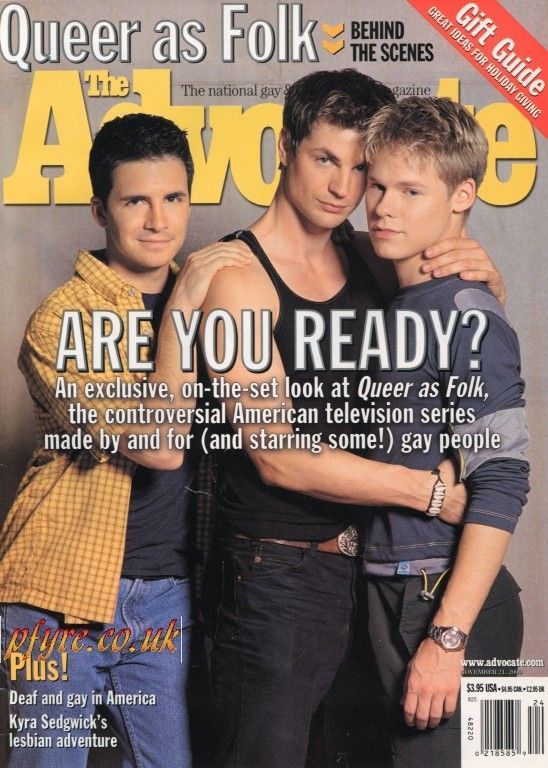
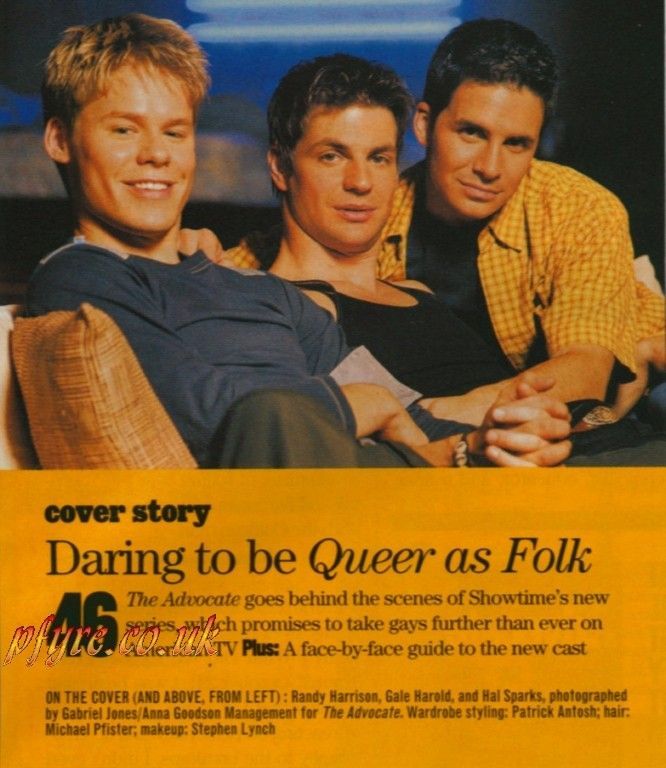
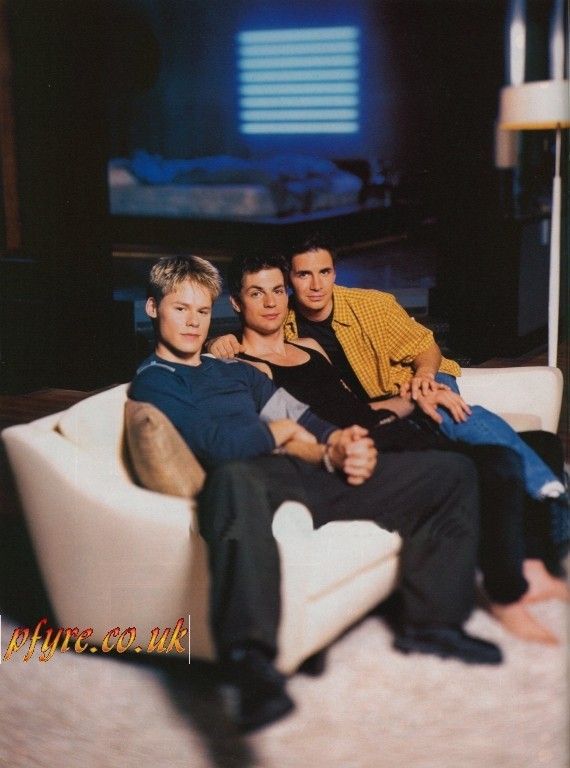
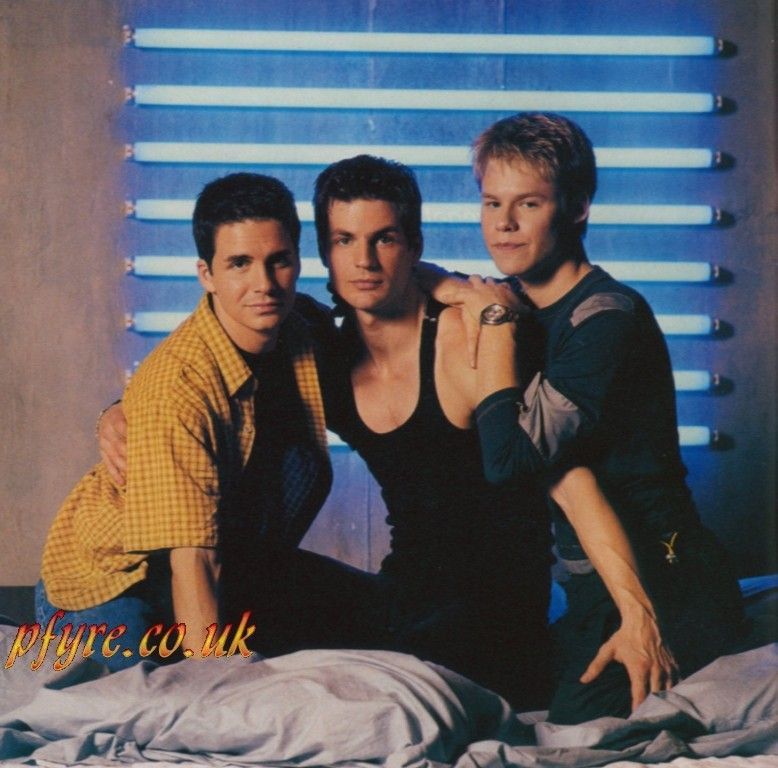
DNA http://www.dnamagazine.com.au/
DNA interview
From DNA, an Australian gay magazine. Fans are calling it the best season yet, and critics praise the maturity of the writing and depth of character development. This season, Justin Taylor, played by 27-year-old Randy Harrison, picks up a gun and joins a gay vigilantesquad. Matthew Myers spoke to Randy about Justin, those sex scenes and life after QaF.
DNA: There are some great character developments in the new season. How do you feel about Justin's?
RH: I think they are dramatic but justified. I mean, it makes sense that he hasn't entirely dealt with having been attacked. Then, when he watches a close friend of his not defending himself, he becomes extreme, goes in the other direction. It was definitely fun to do, just because the material was so different. After three years, I certainly didn't expect to be handling guns and doing combat scenes on Queer as Folk.
DNA: As a vigilante, Justin has a military style buzz cut. Was losing your blond locks a difficult decision?
RH: It wasn't a decision I had to make. If the producers write it, you kind of have to do it. But I was fine. I couldn't care less about my hair and it had been long for a while, so I was ready for a change.
DNA: One of the long-running characters dies this season. Did that storyline have much impact on the cast?
RH: I think it did. Especially because we were losing an actor who had been with us for three years. We shoot in Toronto and most of us don't live there. I live in New York and so does the actor who's left but he's no longer on set with us, so that's sad.
DNA: The new season features testicular cancer, street violence, loneliness, death and even ghosts. Is there a feeling among the cast that the characters are maturing?
RH: Absolutely. I definitely think it's the aim of the writer and producers to move the show forward, certainly as far as the kind of ssues that the characters are being confronted with. They're all growing up and getting older. Now they're starting to deal with aging – not me, particularly, yet!
DNA: Do you hang out with any of the cast outside of work?
RH: Not really. I mean, we all get along and are all friends, but we don't hang out.
DNA: The sex scenes are always pretty hot. How do you and Gale Harold prepare for them?
RH: We don't prepare for them really. Actually, a lot of it is the trick of the camera, the lighting and music that they put on it. Generally we do it as quickly as possible and it depends on how elaborate it needs to be. They sketch out what needs to be done physically like you would choreograph something ahead of time.
DNA: At DNA we get mail from people confusing Justin the fictional character with Randy the actor who plays him. Do you find this too?
RH: Yeah, I do. Fan mail is odd, though. I think it may be normal forTV actors. People have spent four years seeing me playing this one character and they may never see me do anything else. People often confuse me with the character and, yes, I get fan mail addressed to Justin.
DNA: How different is Randy Harrison to Justin Taylor?
RH: I'm very different. We have very little in common, actually.
DNA: We wouldn't find you hanging out at a club like Babylon, then?
RH: No, I don't go to dance clubs. I don't listen to that type of music or go to gay bars. Although, I'm an artist in a way, I'm not a visual artist. I'm an actor. You know, my hair's a different colour.
DNA: What? You're not blond?
RH: [Laughs] No. That's fake hair! They bleach it for the show. My real hair colour is a dark blond or light brown.
DNA: You did a photo shoot for Vanity Fair with the stars of Will and Grace, Queer Eye and Boy Meets Boy. What was that like?
RH: It was fun. It happened really fast. It was right before we started shooting last year. It was great to meet all those people and they were all really kind. We all got glammed up in a studio in Los Angeles.
DNA: Queer as Folk has pushed many television boundaries. Do you feel like you're part of an historic gay era?
RH: I definitely feel that since the show started the amount of gay subject matter on TV has just skyrocketed. I wonder if it will completely shift the paradigm, or if it's just sort of a fluke. But it seems to me as if television has changed with it. I don't know necessarily if Queer as Folk is responsible, but it's good to know that you're a part of it in some way.
DNA: In Australia, we have a lesbian storyline on a prime-time drama called Neighbours. It's a big thing because it's on at 6.30 pm and it's a very unadventurous show.
RH: Yeah. On All My Children, which is a big soap opera here, there has been a lesbian storyline happening for awhile, maybe even before Queer as Folk started. And the lesbian is one of the lead characters.
DNA: Had you every watched Sharon Gless in Cagney and Lacey?
RH: [Laughs] No, I haven't. I think I've seen half an episode recently. I knew who she was and I knew of Cagney and Lacey, but I haven't actually watched the show.
DNA: You were in a film about high school shootings called Bang, Bang, You're Dead. Can you tell us about your character?
RH: I played Sean. He was based on a combination of real life characters: Kip Kingle, who killed his parents and then himself after he had gone to school and killed a bunch of people, and also a mixture of the two Columbine killers, Eric Harris and Dylan Klebold. I did a lot of research on those people and it was really difficult shooting that movie. It was painful and frustrating. I mean, I'm satisfied with it, but it was just really difficult having to live here for the duration of that movie. Having to think and feel that way and try to examine the world that those people lived in.
DNA: On a lighter note, you were once in a stage production of Grease.
RH: [Laughs] I was in the ensemble of Grease when I was 17. I actually got my Actor's Equity card in Grease. In St Louis there's an enormous outdoor theatre, which I think is one of the biggest in the country, and I was cast and became an official actor!
DNA: How long does it take to shoot one episode of QaF?
RH: We're shooting the fifth season now and we're shooting one episode in eight working days. But in past years we did it in seven.
DNA: Will this season be the last?
RH: We don't definitely know yet. We're waiting to hear.
DNA: How cool is it for a gay man like yourself to be living in New York?
RH: I love New York City! I might be biased, well, of course I'm biased! I love it. For the past five years I've been in Toronto all winter and then for the spring, summer and fall I live in New York. It's ridiculously expensive to live here though. I may have to leave Manhattan and go to Brooklyn!
DNA: It's reported that public appearances and autograph signing that the QaF cast do are like Beatle-mania! Is that true?
RH: It is! It's insane. It's actually the one time of the year when we can go out and connect with the audience and the people. I don't know about in Australia, but the fan base here is small but loyal. They love the show and know every episode and everything we have done in our careers. So it feels good to actually meet those people who have been with the show since the beginning. It is like Beatle-mania and it's very draining.
DNA: Australia Russell Mulcahy directed the very first episode of QaF. How did you find working with him?
RH: Oh yeah, Russell's incredible. He came back in the second season as well for a couple of episodes. He's an incredible man. He's got such energy and he's capable of shooting so much more film in a day than anybody else. He's just fanatically shooting all the time. And he's funny.
DNA: Have you seen the British version?
RH: Yeah, I saw the first episode of the British version but not until well into shooting our first season, after I had already shot that portion I also liked Bob and Rose, the series that Russell T Davies, who wrote QaF, did later on.
DNA: How do you see the future for openly gay actors being cast in straight roles?
RH: I honestly don't know, but I hope it's going to be great. I don't actually think I've had that much of a problem. I can't imagine what a gay actor will have to do in order to be cast as the straight male lead in a film. I mean, I'm sure it will happen eventually. But I think actors always have to fight to prove themselves – for any role. I think being gay is just something that people, who would be arguing against you in a role, could try to use against you.
DNA: After QaF what types of roles would you prefer to have?
RH: Immediately, I really want to do something classical or period, something very far away from Babylon. I'd love to do something classical on stage too.
DNA: Is there one QaF episode that's your favourite?
RH: Yes. My favourite is still the last episode of the first season.
DNA: The prom?
RH: Yeah. Getting my head bashed in! It was the most fun to do, but it is still kind of upsetting when I see those pictures of the bloody scarf and all that.
DNA: But before that scene, it was all about Justin and Brian dancing together. That was great. It was a very powerful p_w_picpath.
RH: Yeah, it was like a little musical number in the middle of this dramatic series. It was out of character for the show but at the same time it worked perfectly!
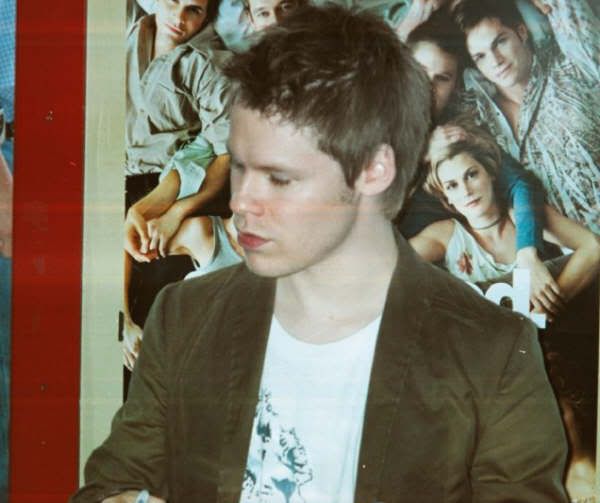
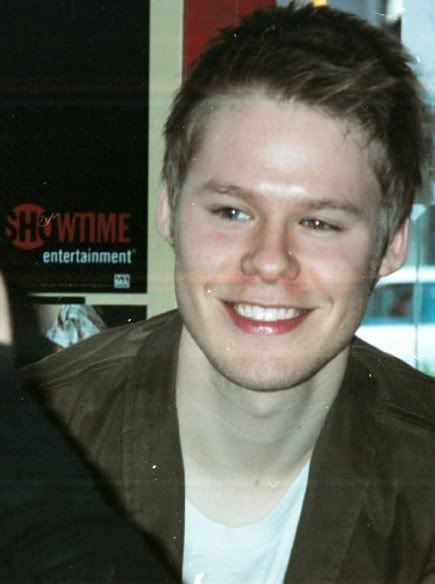
OUT - December 2000
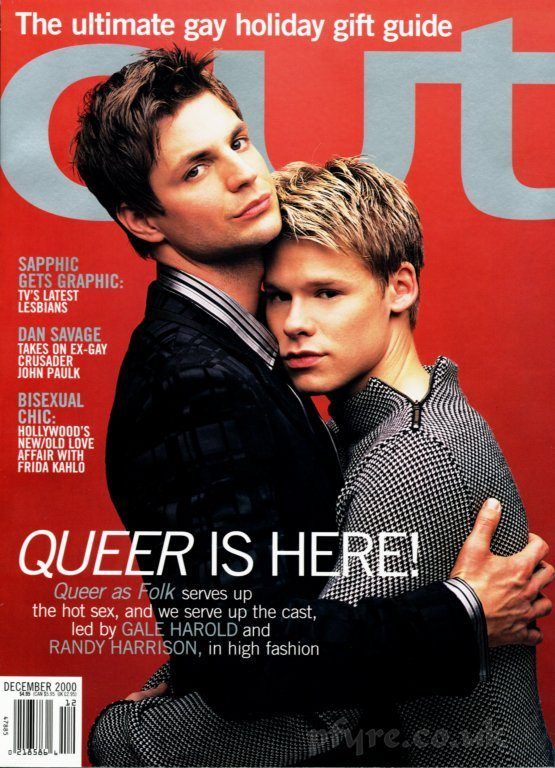
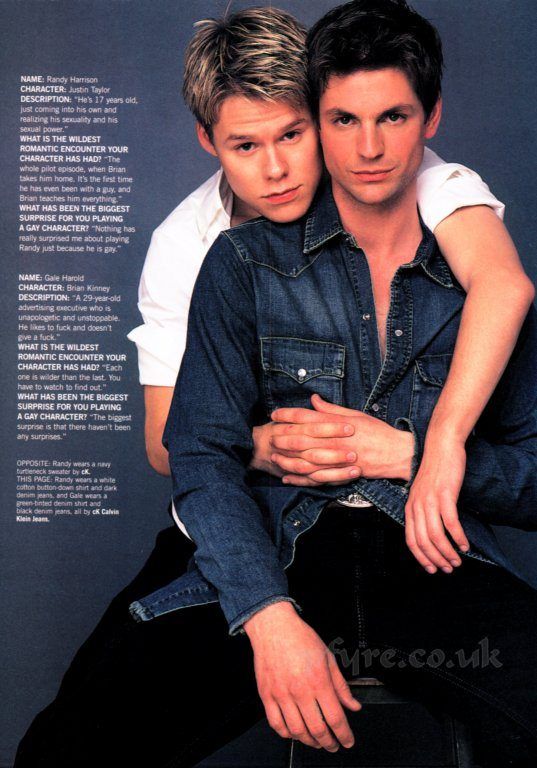
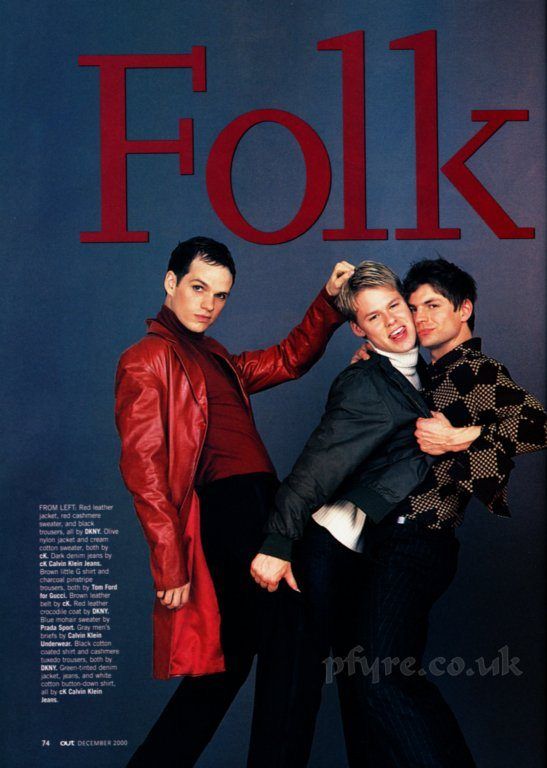
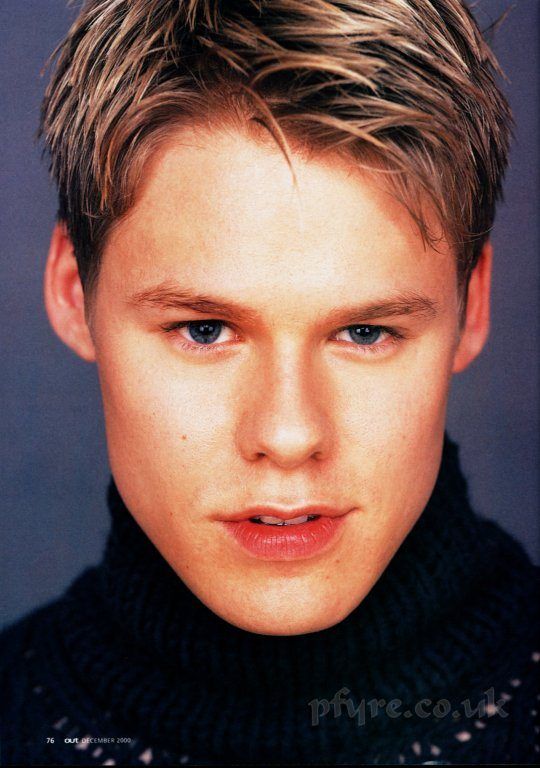
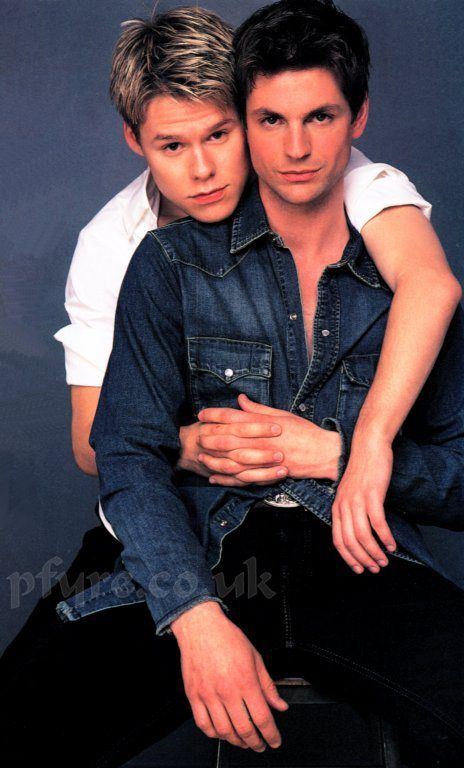
OUT - 100 Gay Entertainers Issue-2001
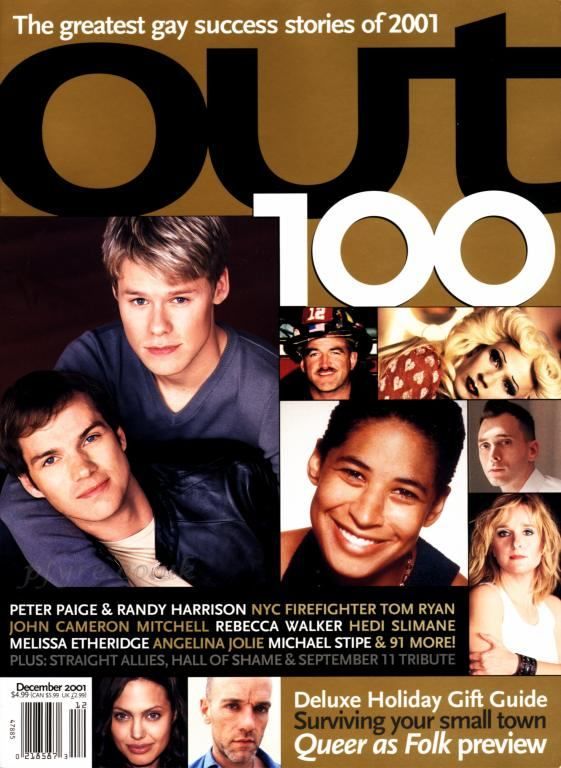
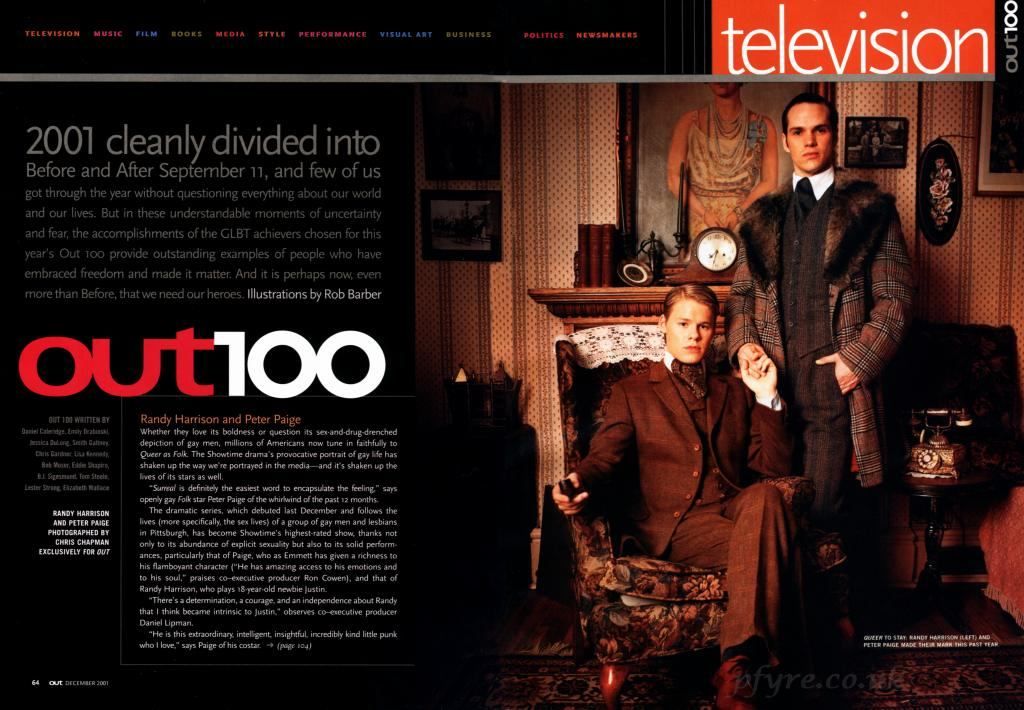
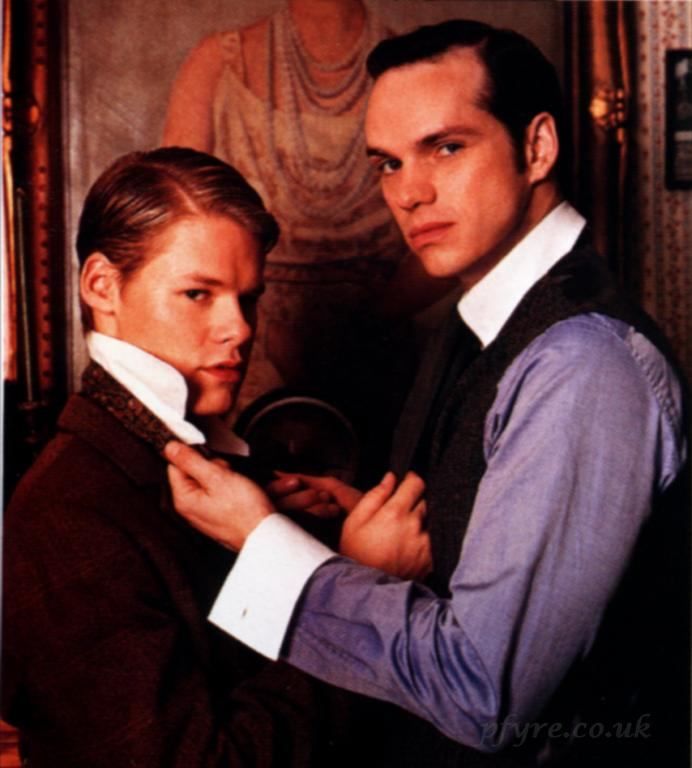
Out 100
From heroic New York firefighter Tom Ryan to Queer as Folk fun-lovers Randy Harrison and Peter Paige, from Ellen and Melissa to pioneering attorney Mary Bonauto, from the glitziest beauties to the grittiest advocates, we give you the greatest gay, lesbian, bisexual, and transgender success stories of 2001—and an exclusive Queer as Folk preview to boot.
XY-Skewl Issue - NOVEMBER 2000 www.xy.com
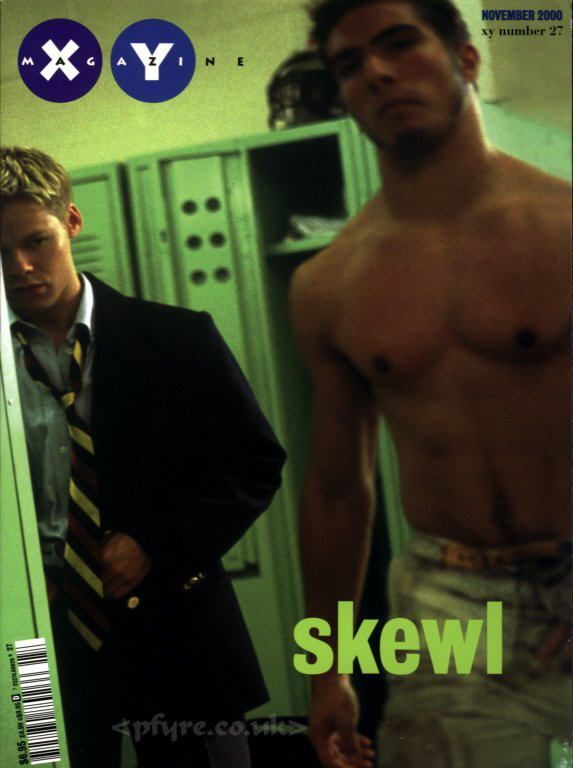
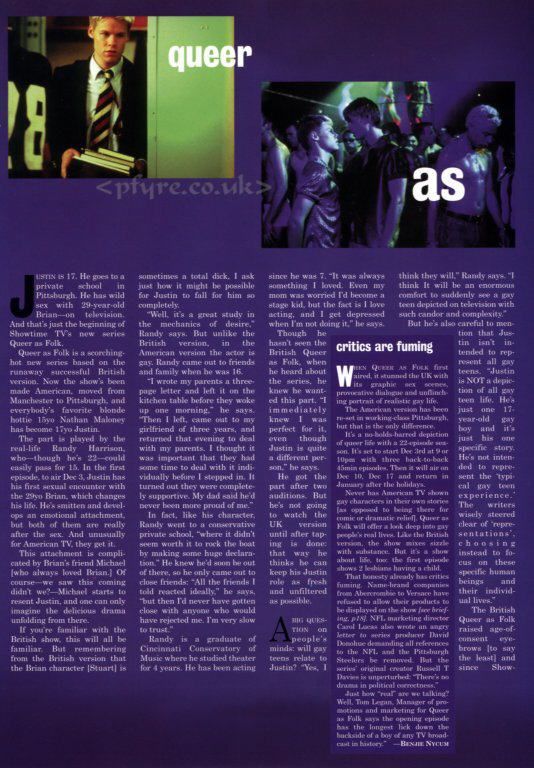
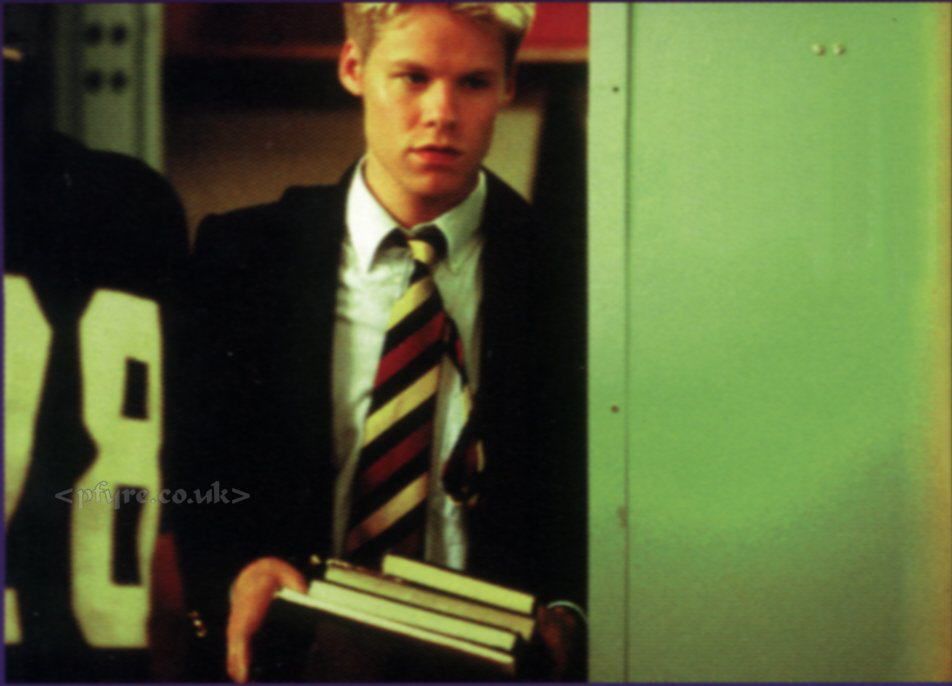
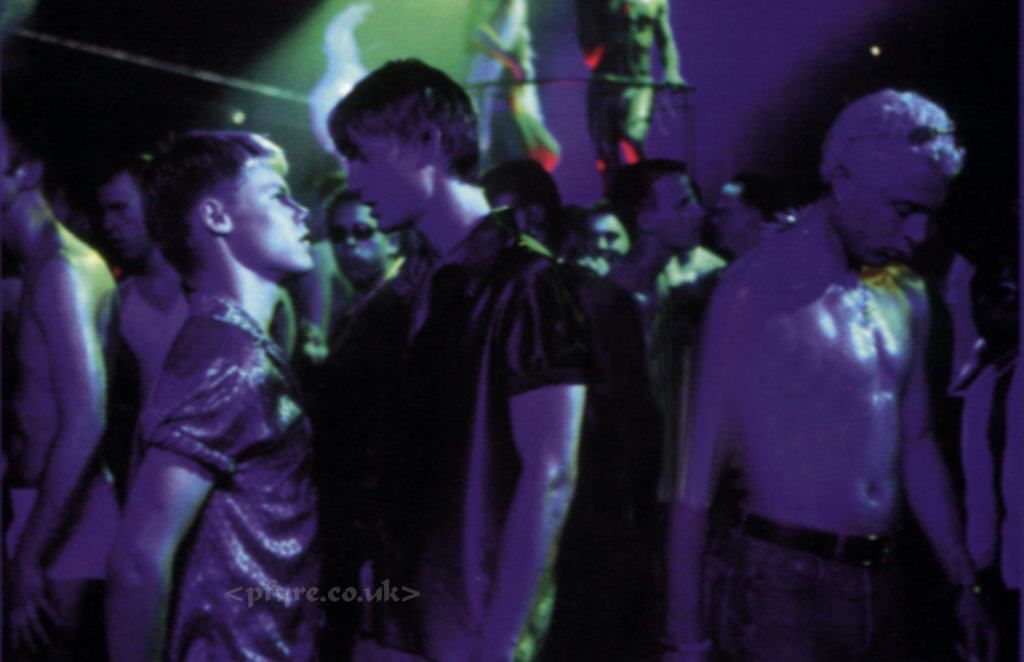
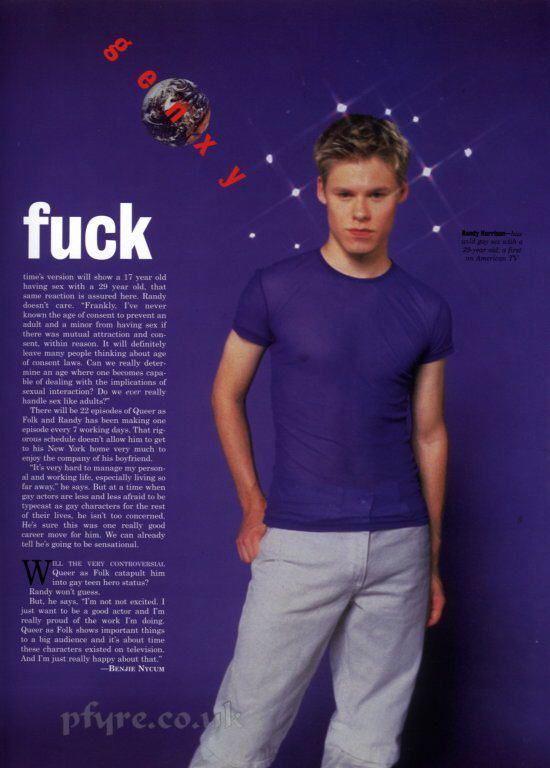
NEXT
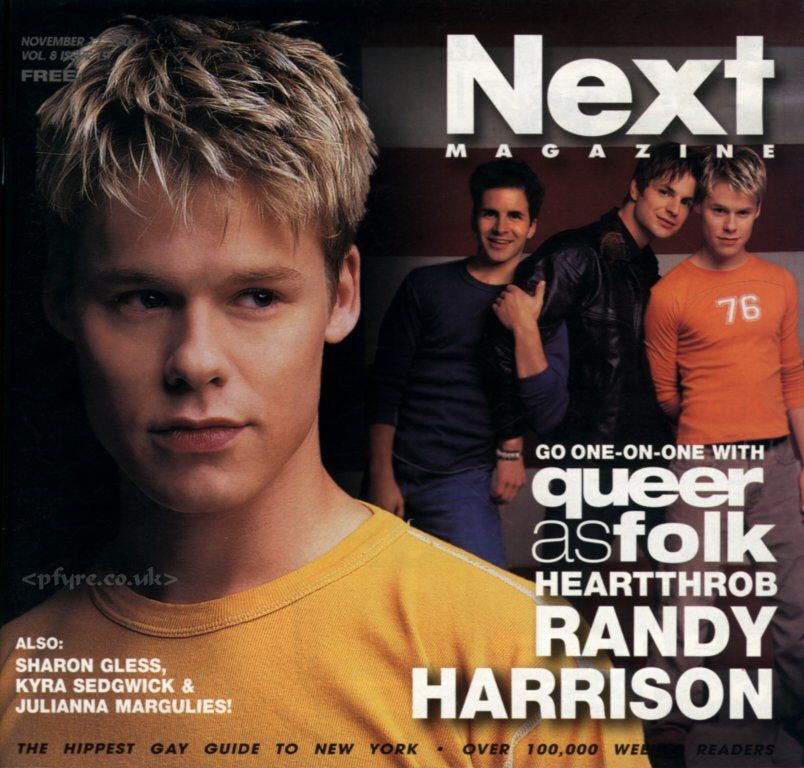
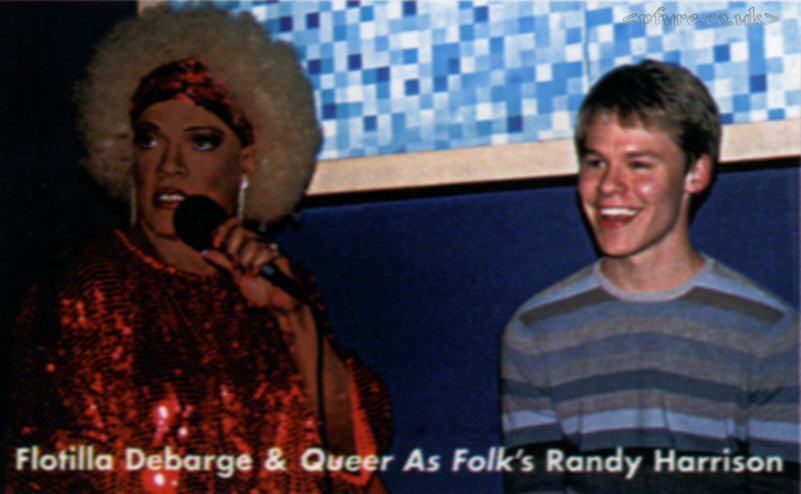
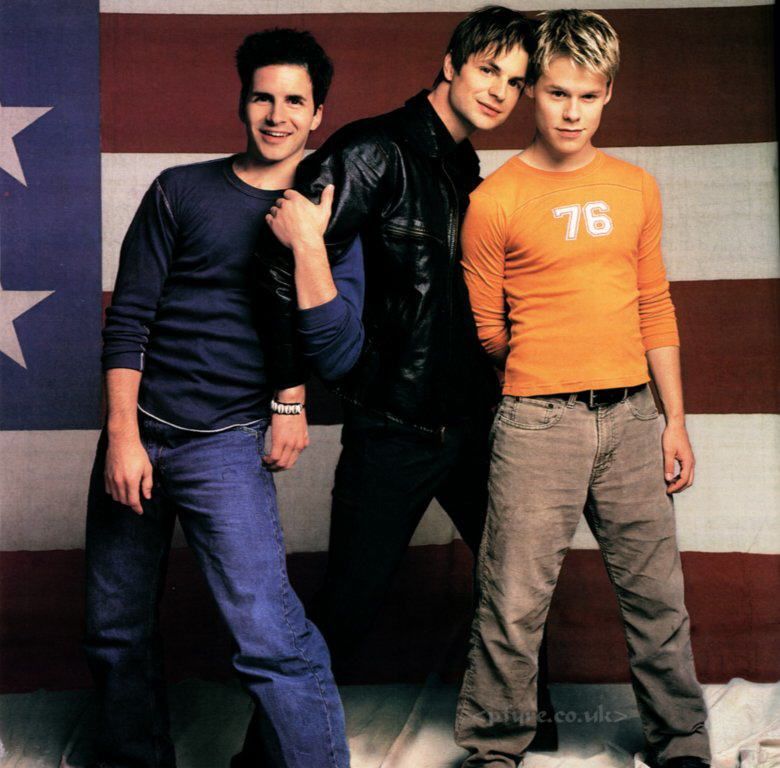
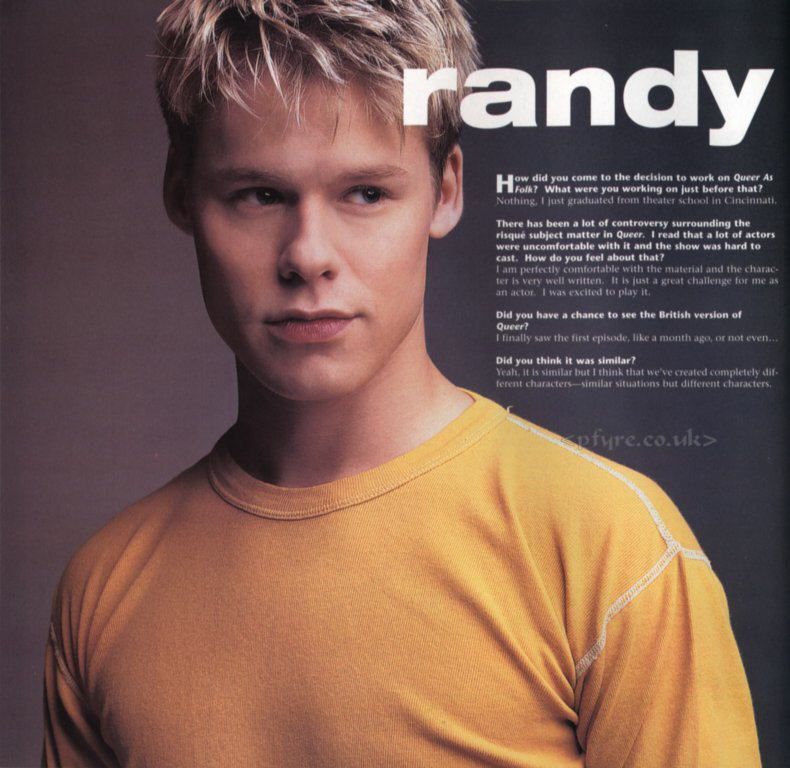
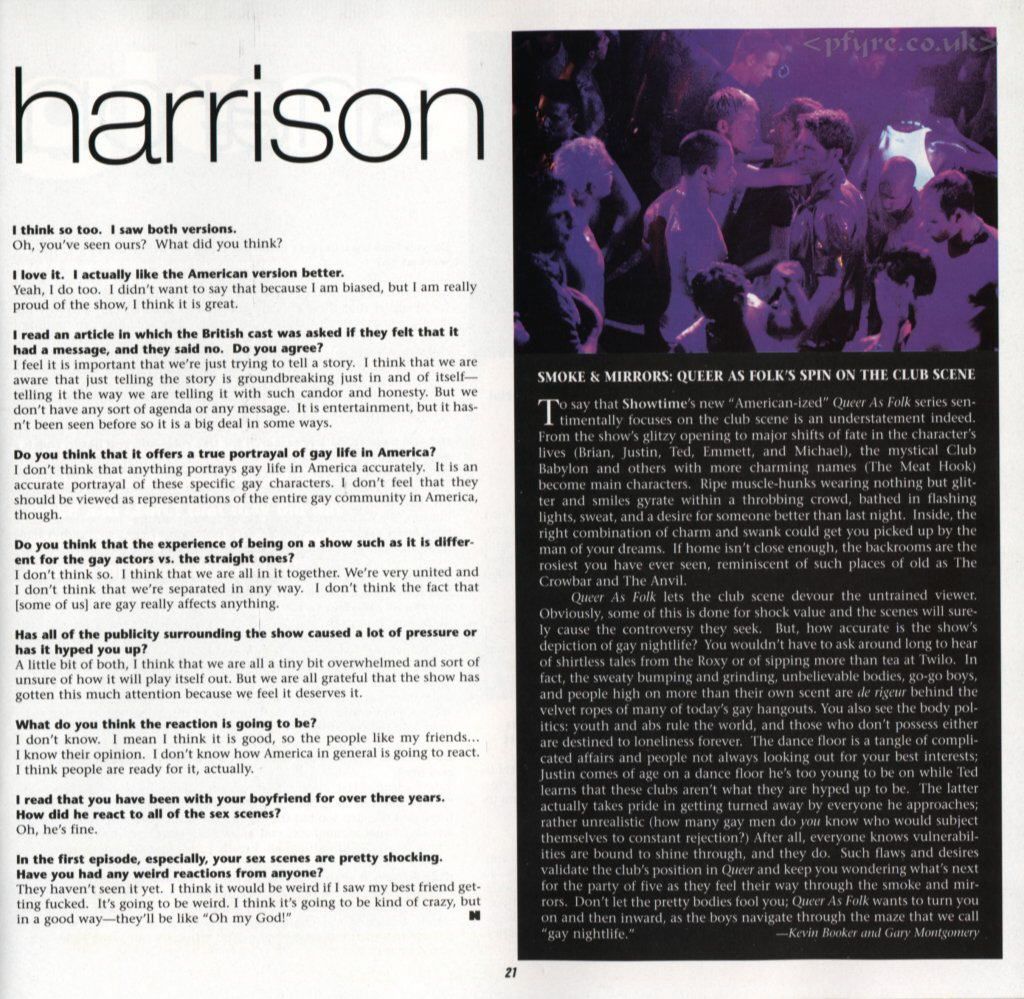
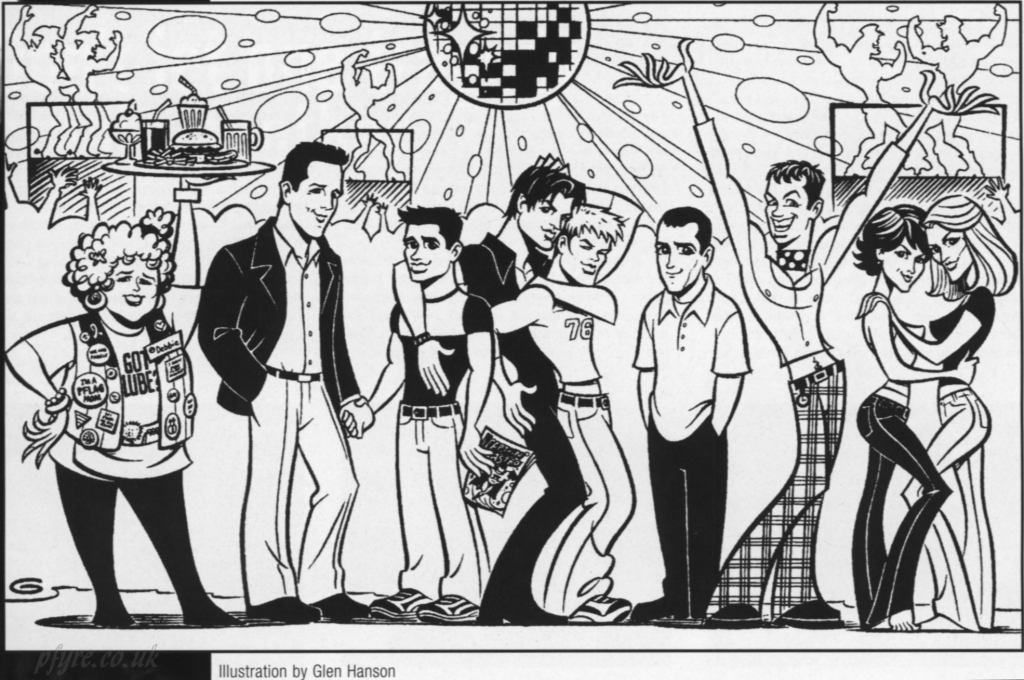
bang bang you're dead
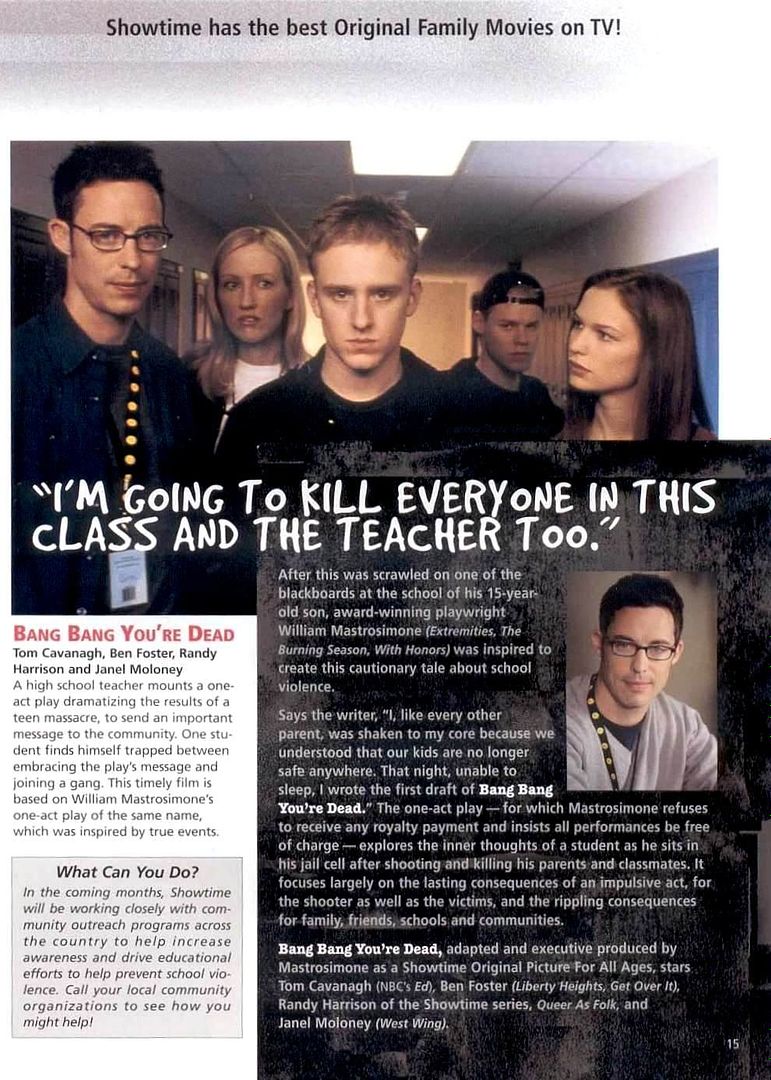
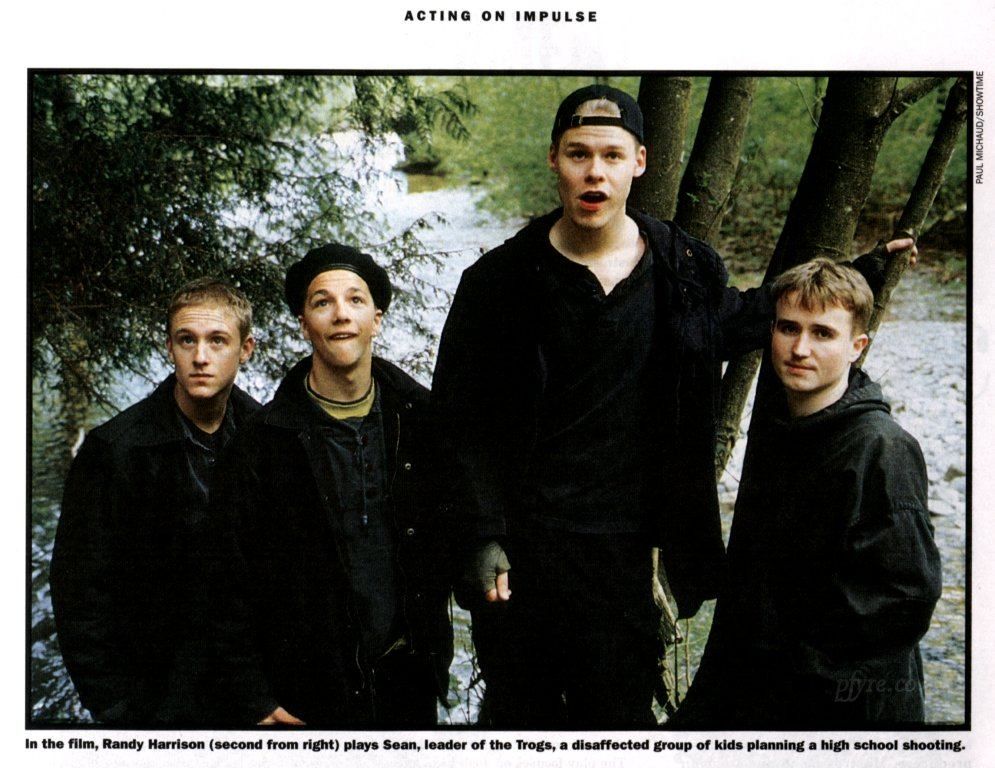
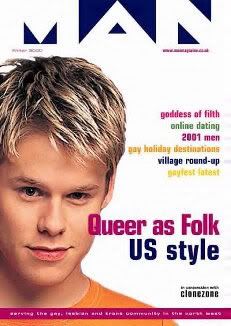
XtraWest - 8 FEB 2001
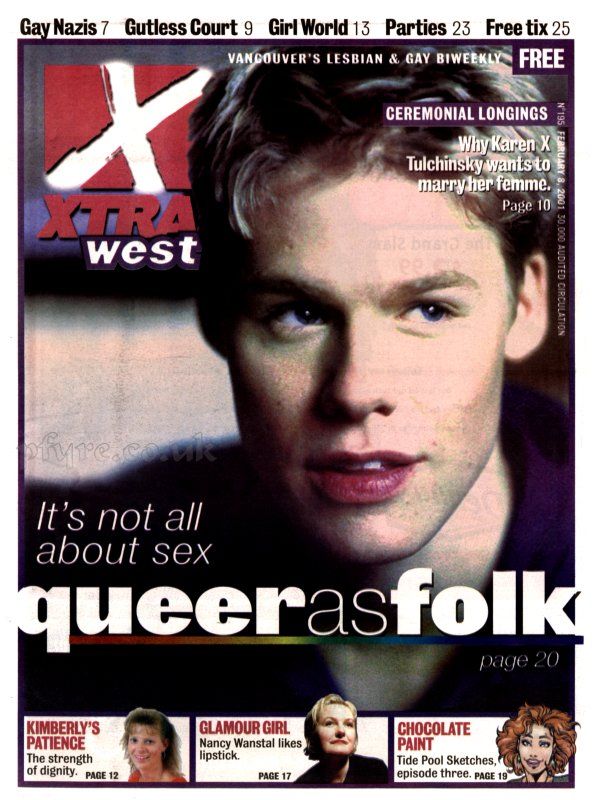
ETC - 18 JAN 2002
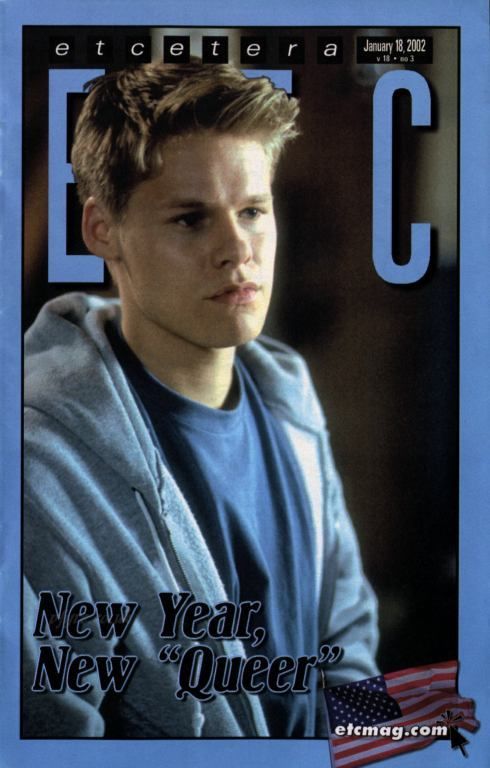
HX - 27 May 2005
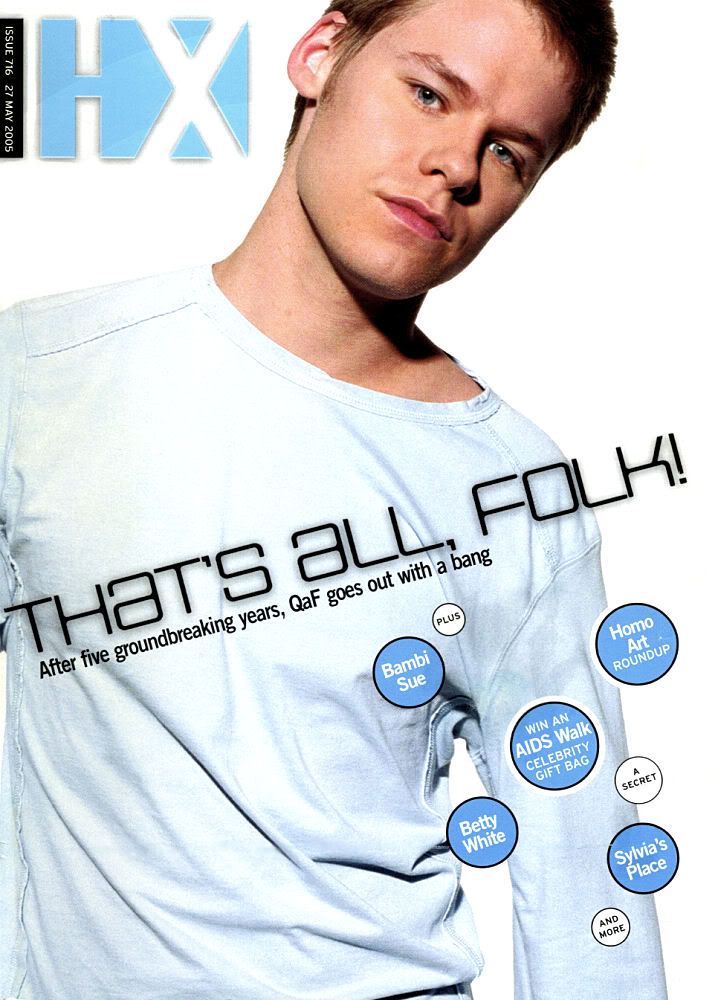
[ 本帖最后由 qqqq2046 于 2006-8-15 01:03 编辑 ] |
|


















